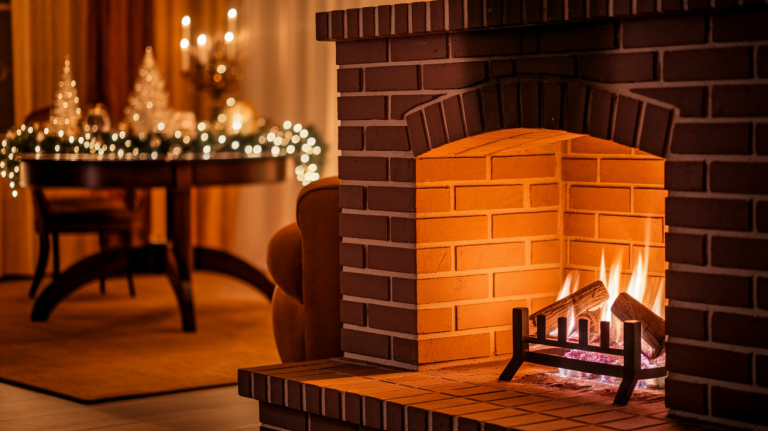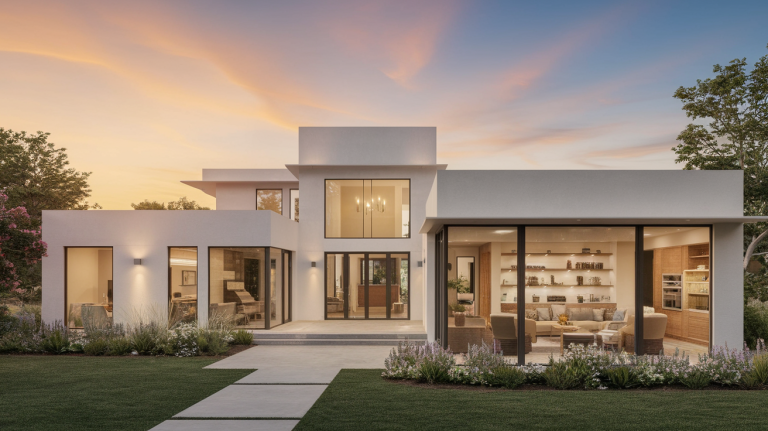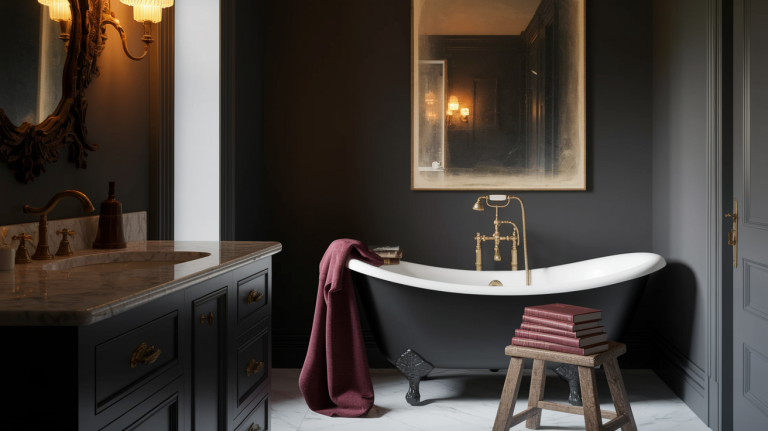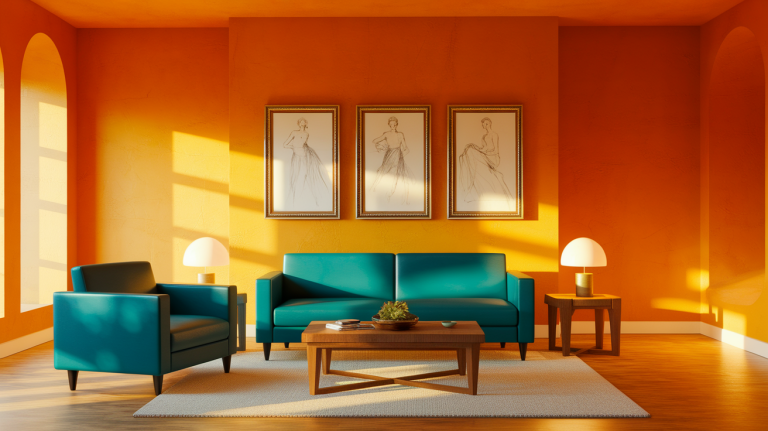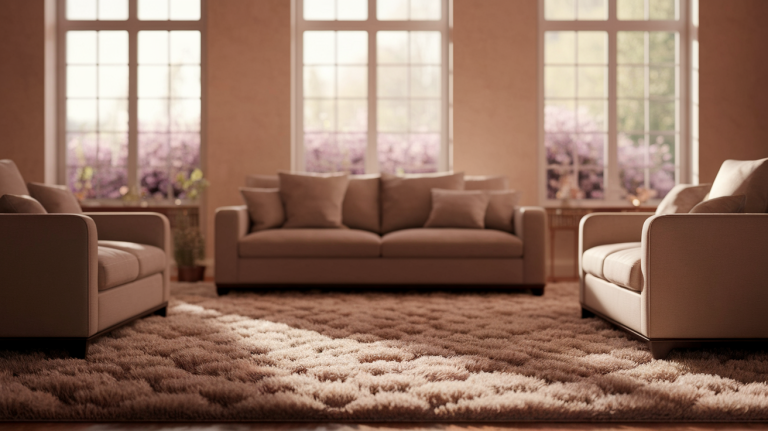27+ Creative Modern Organic Living Room Ideas
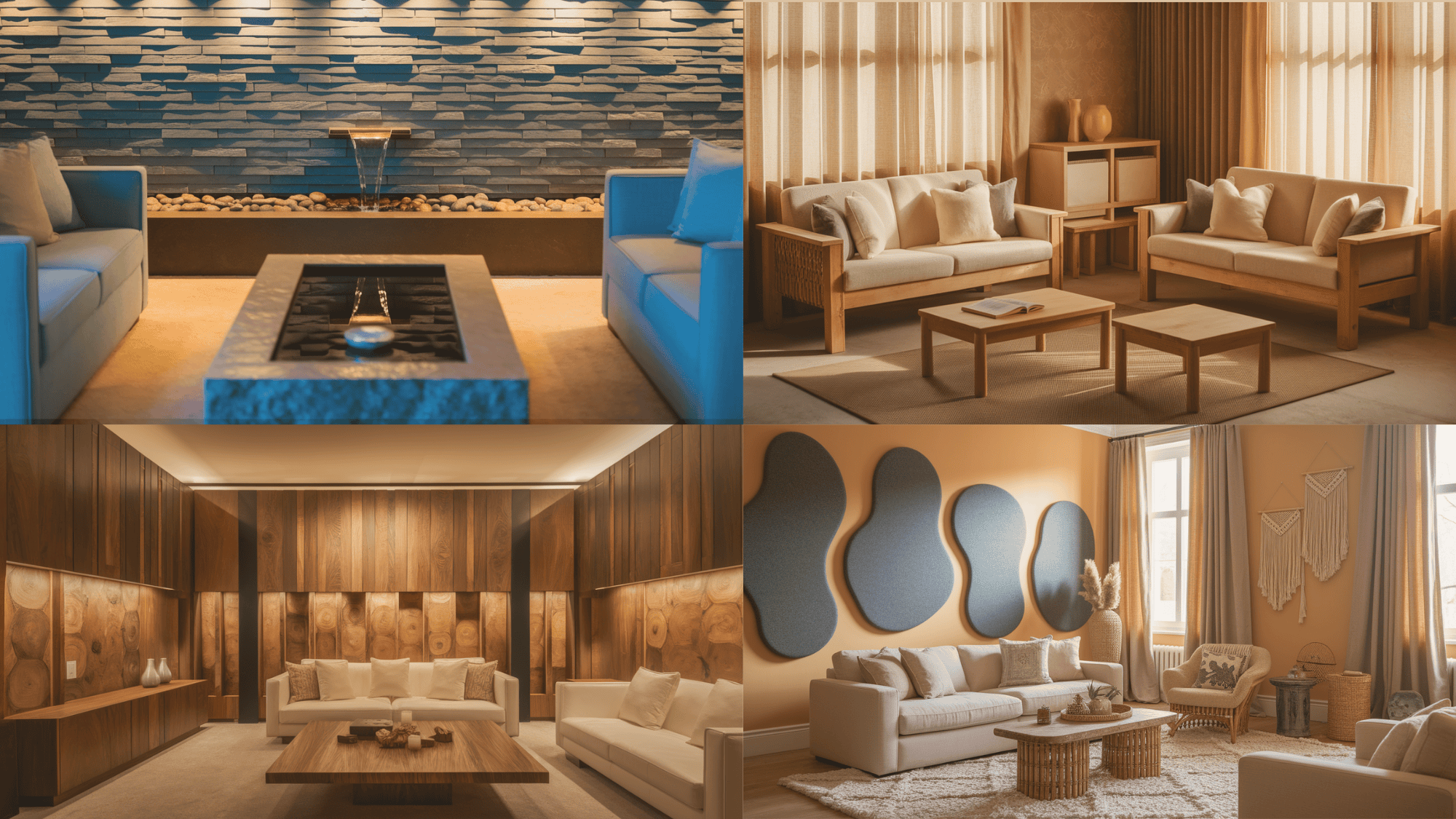
Organic living spaces offer comfort without artificial elements, bringing the outdoors inside. Materials from wood to stone create houses that feel healthy and grounded.
These rooms connect us to nature through raw textures, pure light, and organic objects. Simplicity meets function in ways that calm minds while supporting daily activities.
This blog covers a collection that shows how natural rooms work for various tastes and settings.
From light-filled minimalist looks to rich, cozy spaces with a plant focus, options suit all.
Modern Organic Living Room Ideas
Here’s a list of ideas for creating a modern organic living room, blending natural materials, neutral tones, and sustainable design elements for a harmonious, eco-friendly space.
1. Minimalist Wooden Haven
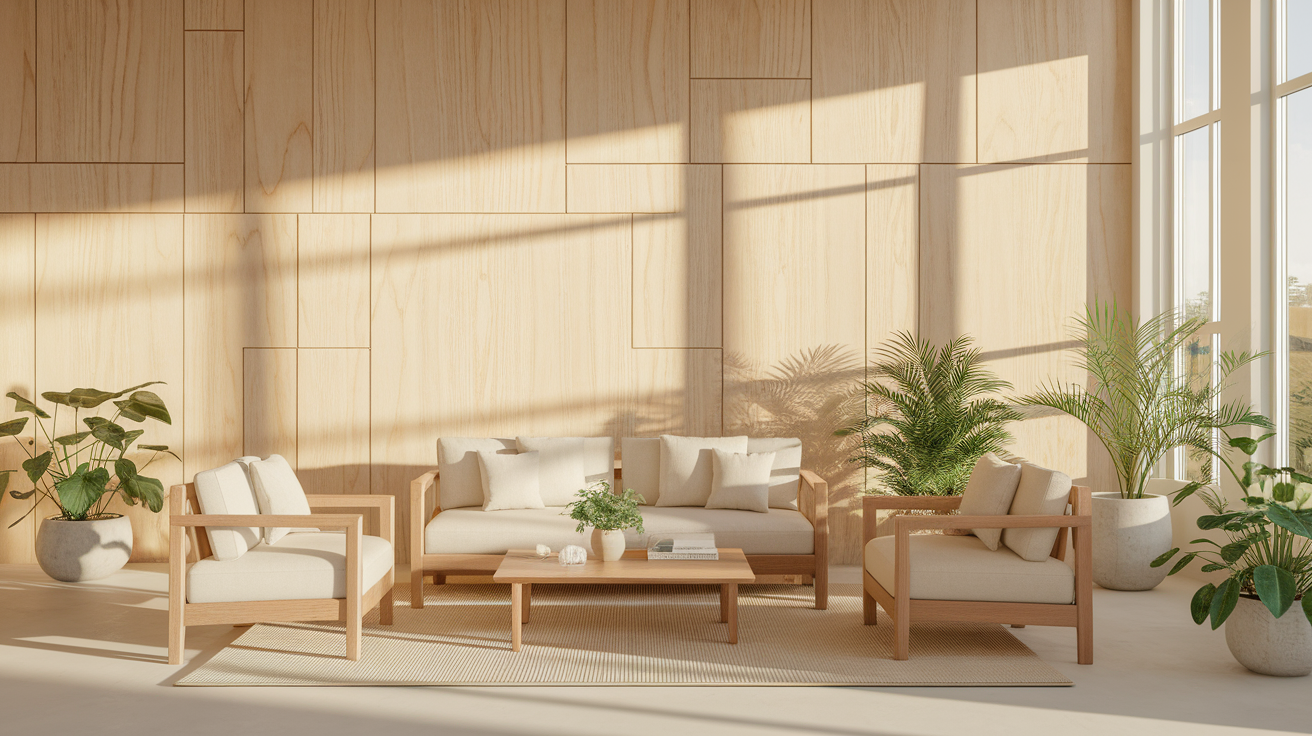
Raw wood panels form a cozy background for simple, clean furniture pieces. The room stays open yet familiar with carefully chosen items.
Sunlight comes through big windows, clearly showing wood grain patterns, while plants add liveliness without excess in the space.
| Main Idea | Focus on plain wood furniture and items |
| Best Tip | Add small stone or clay items for contrast with the wood |
2. Earth-Toned Sanctuary
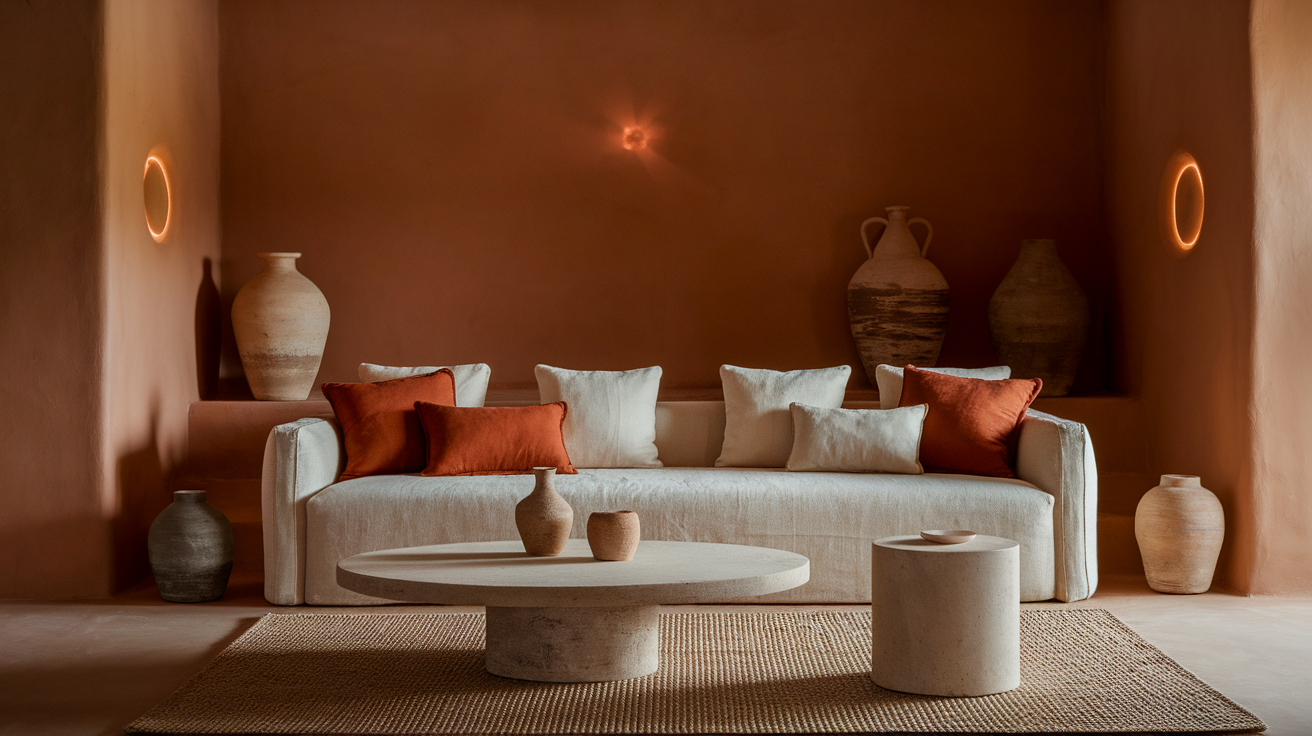
Clay-colored walls form a solid base for this quiet space. Cotton and linen covers in various soil shades create visual layers without artificial colors.
Handcrafted clay items and stone objects bring a genuine connection to natural components, making this room feel like an extension of outdoor settings.
| Main Idea | Use browns, tans, and greens |
| Best Tip | Mix different textures but keep colors similar – try rough cotton next to smooth linen |
3. Plant-Focused Room
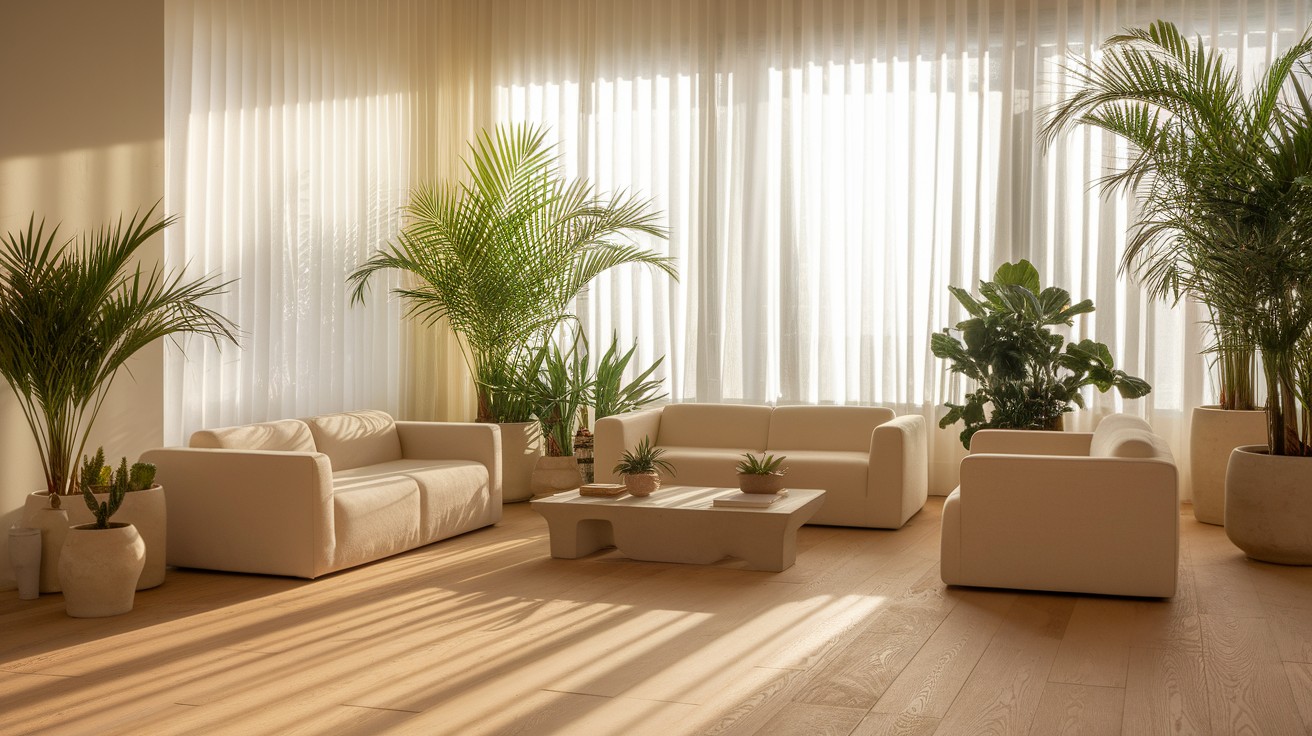
Indoor plants become main features in this green-centered plan. Various sizes create a small ecosystem within your home environment.
Modest furniture takes secondary roles, while natural light flows through minimal window covers to help plants grow and create shifting light spots.
| Main Idea | Make plants the main focus |
| Best Tip | Create different height levels for plants using simple wooden stands or stone bases |
4. Simple Asian-Inspired Space
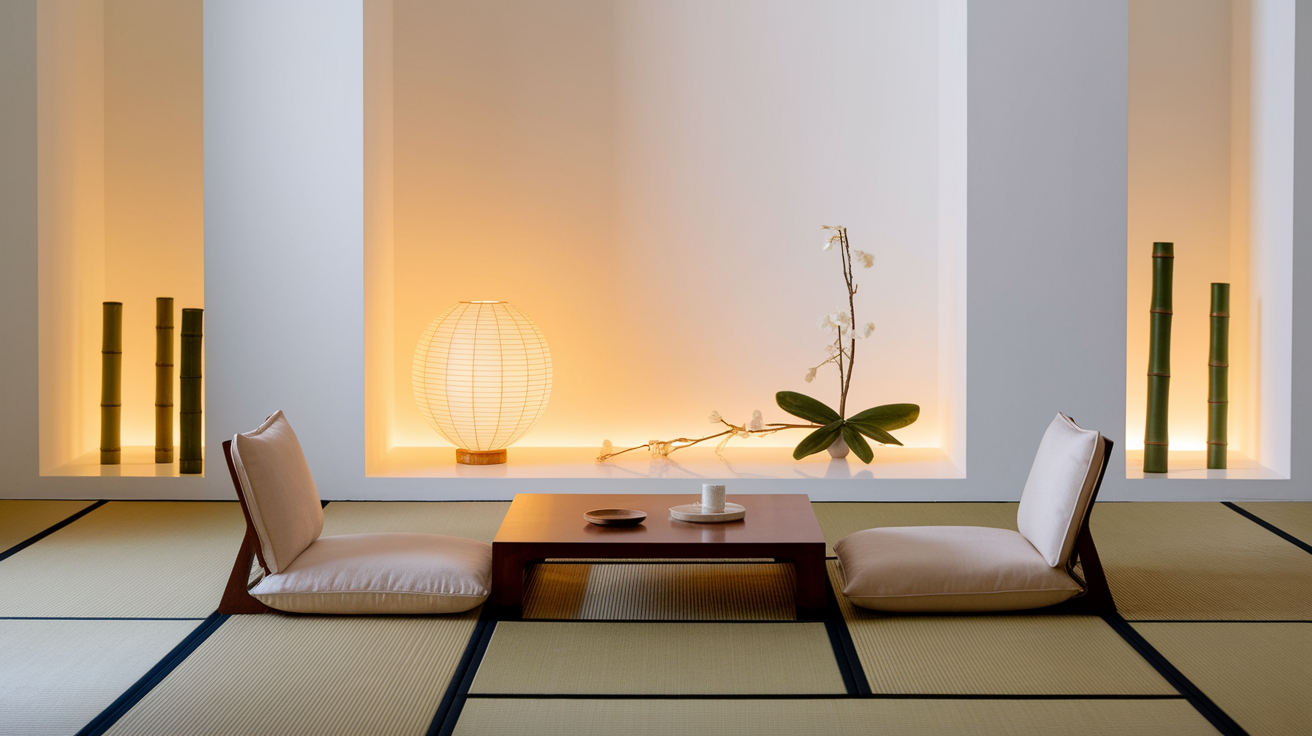
Clean outlines and open areas define this Japanese-inspired natural living space. Low furniture creates a strong feeling with bamboo touches.
The colors are purposely limited to whites, blacks, and wood tones, creating a thoughtful, calm mood throughout the room.
| Main Idea | Clean lines and open space |
| Best Tip | Use paper lanterns with soft, warm lighting to create a calm mood |
5. Old-New Combination
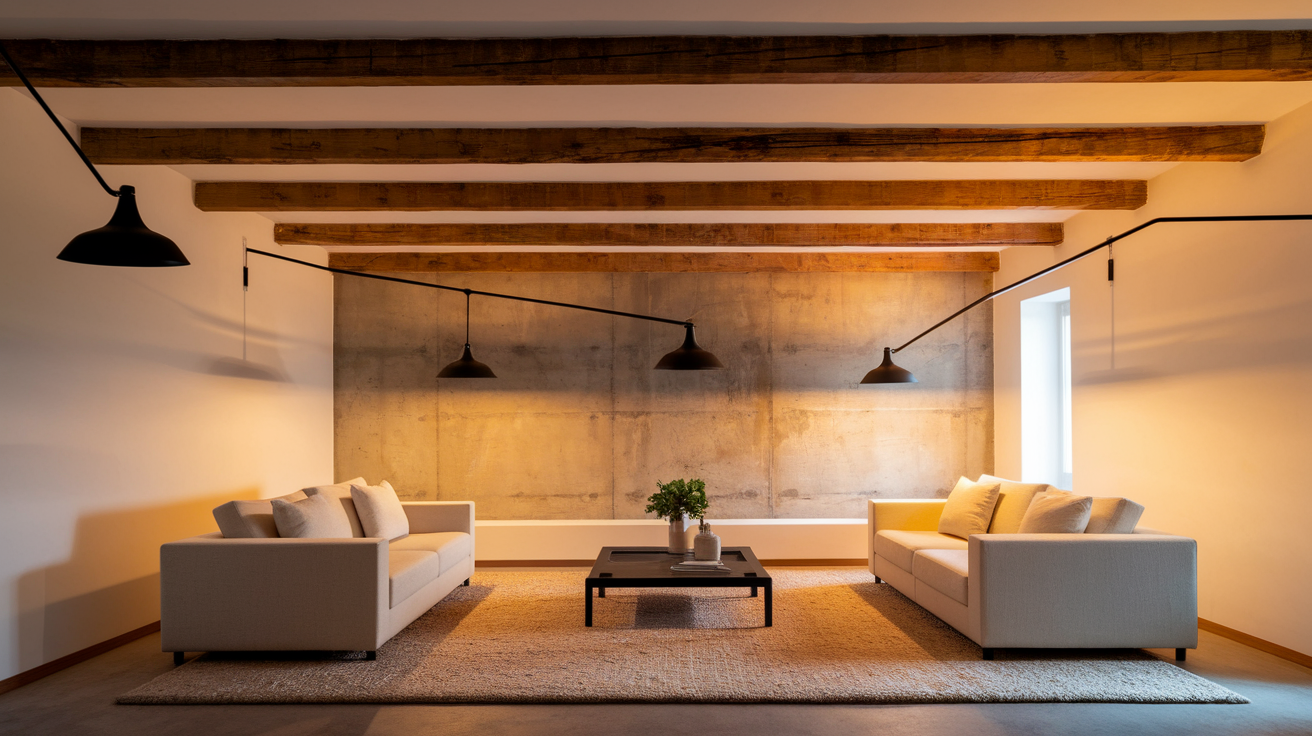
In this balanced approach, used barn wood meets smooth modern lines. Old wooden beams contrast with flat concrete surfaces for texture variety.
Black metal parts provide structure without looking too industrial, while soft wool fabrics add comfort to the overall design.
| Main Idea | Blend old items with new ones |
| Best Tip | Add cloth art made from natural fibers to soften the contrast between old and new |
6. Southern European Natural Style
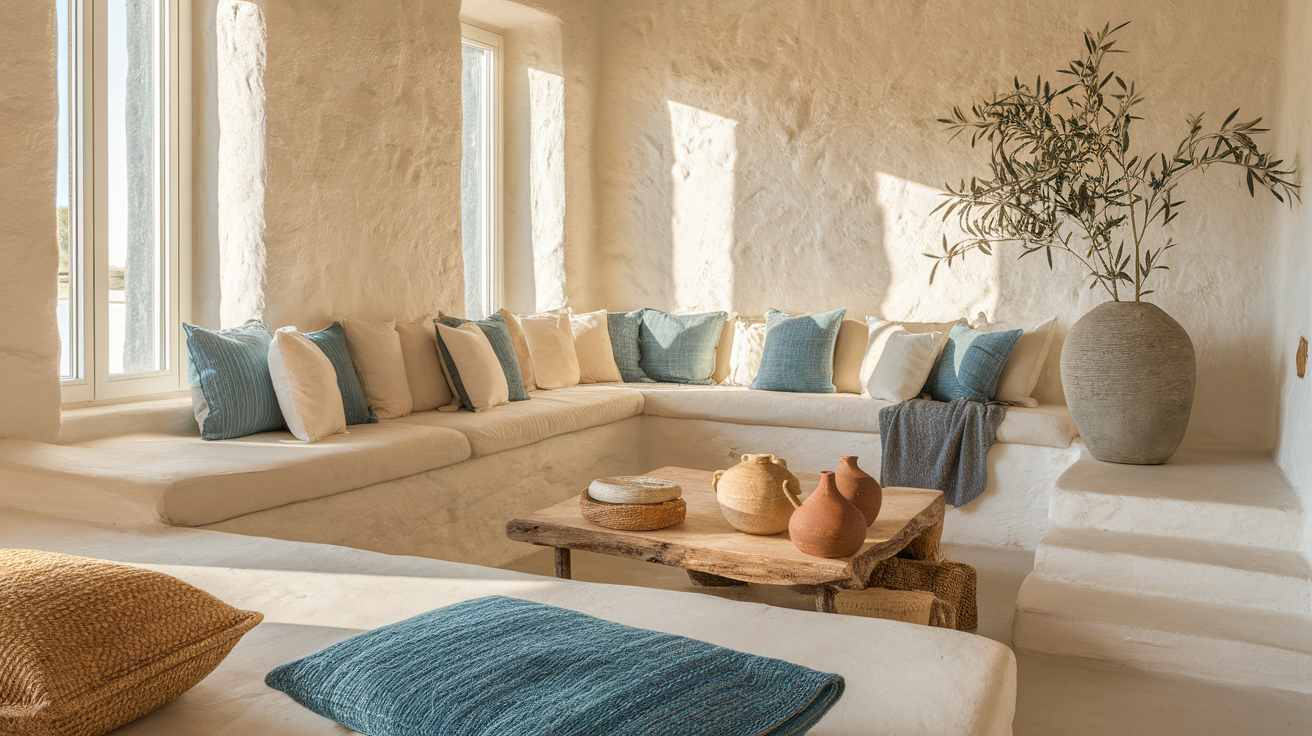
Bright plaster walls in soft white make a light-filled background, similar to Greek island homes.
Natural stone floors remain cool when walked on while adding true character through visible pattern changes.
| Main Idea | Warm colors and rustic items |
| Best Tip | Add clay pots with herbs like rosemary and thyme to bring nice smells to the room |
7. Nordic Natural Design
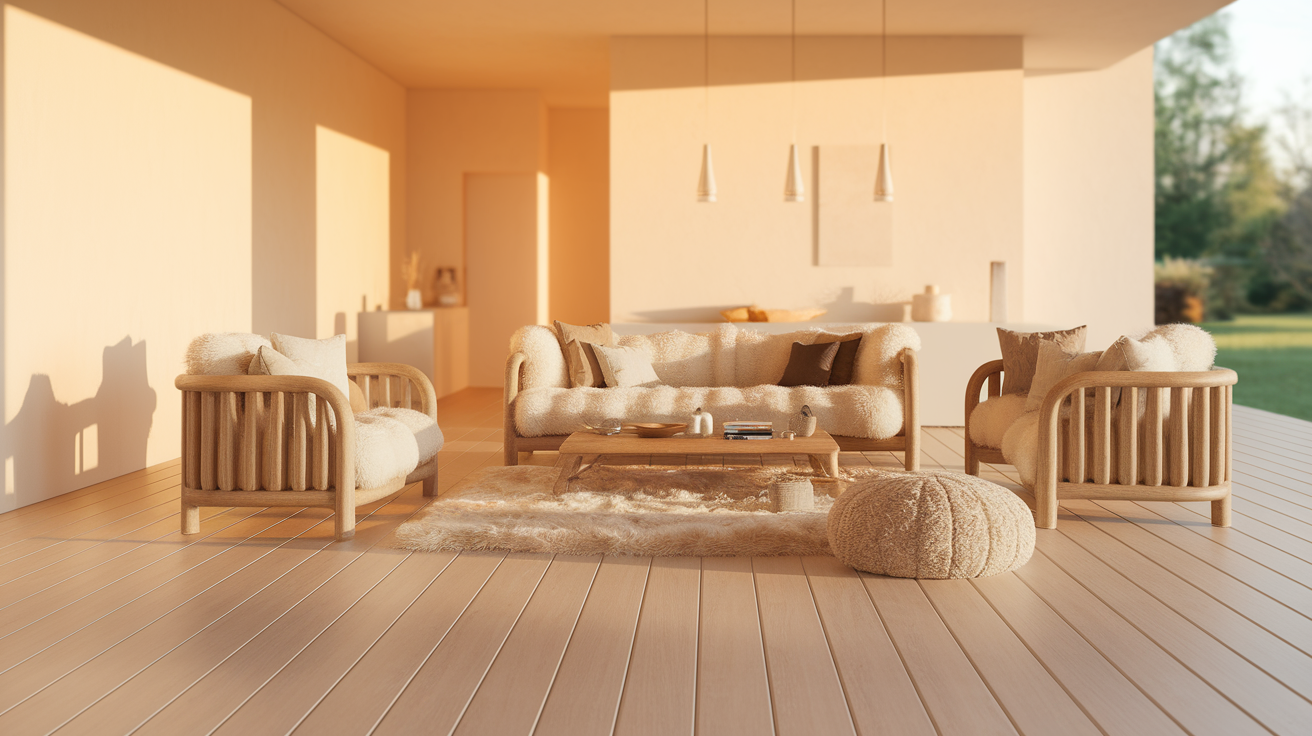
Pale woods like birch create an open foundation that makes the most of the limited northern daylight. Simple furniture with soft curves offers comfort.
Animal skins and wool blankets add needed warmth and texture, making the area comfortable during cold winter months.
| Main Idea | Light woods and clean design |
| Best Tip | Place round sheepskin rugs to make cozy sitting spots on wooden floors |
8. Natural Light Effects
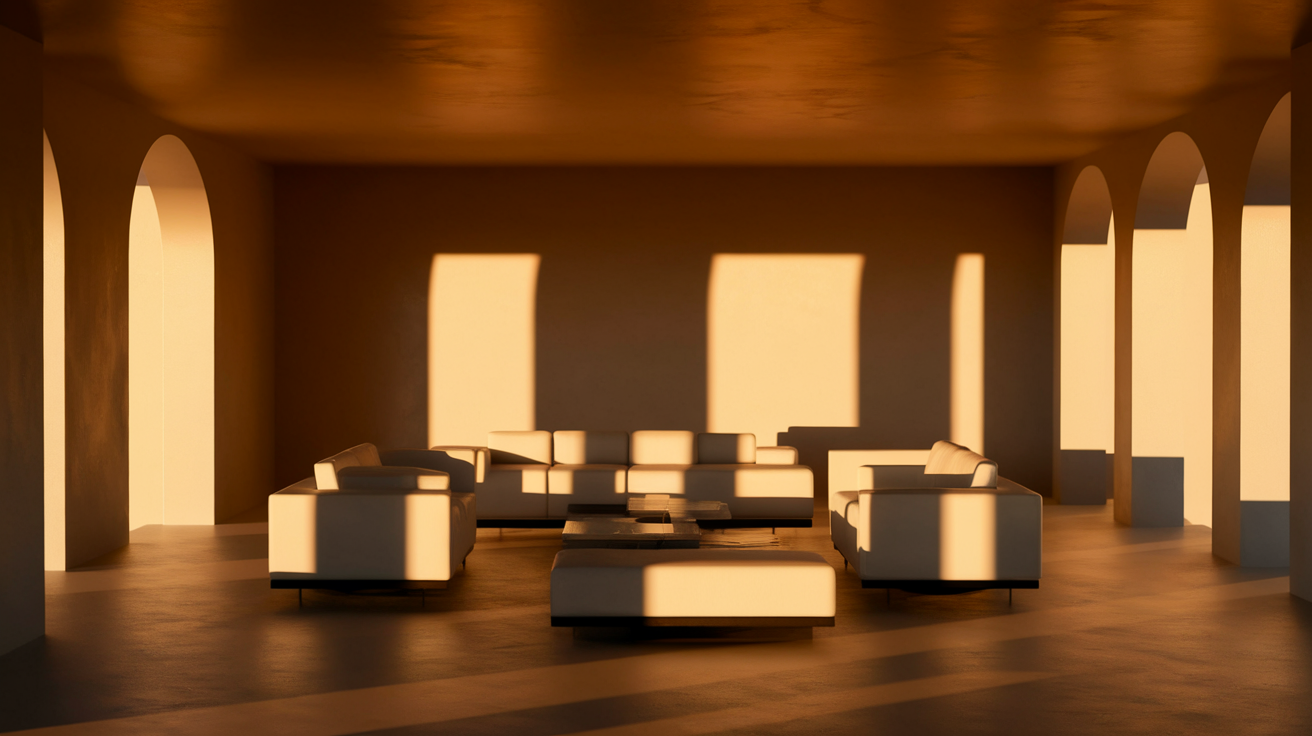
A room is built to capture and show the progress of sunlight throughout the day. Placed walls and screens create moving patterns as the sun crosses the sky.
This method values the constant change in natural light situations and makes time visible through shadow shifts across surfaces.
| Main Idea | Plan around how light moves |
| Best Tip | Put crystals or glass objects near windows to create rainbow patterns at certain times of day |
9. Single-Color Natural Room
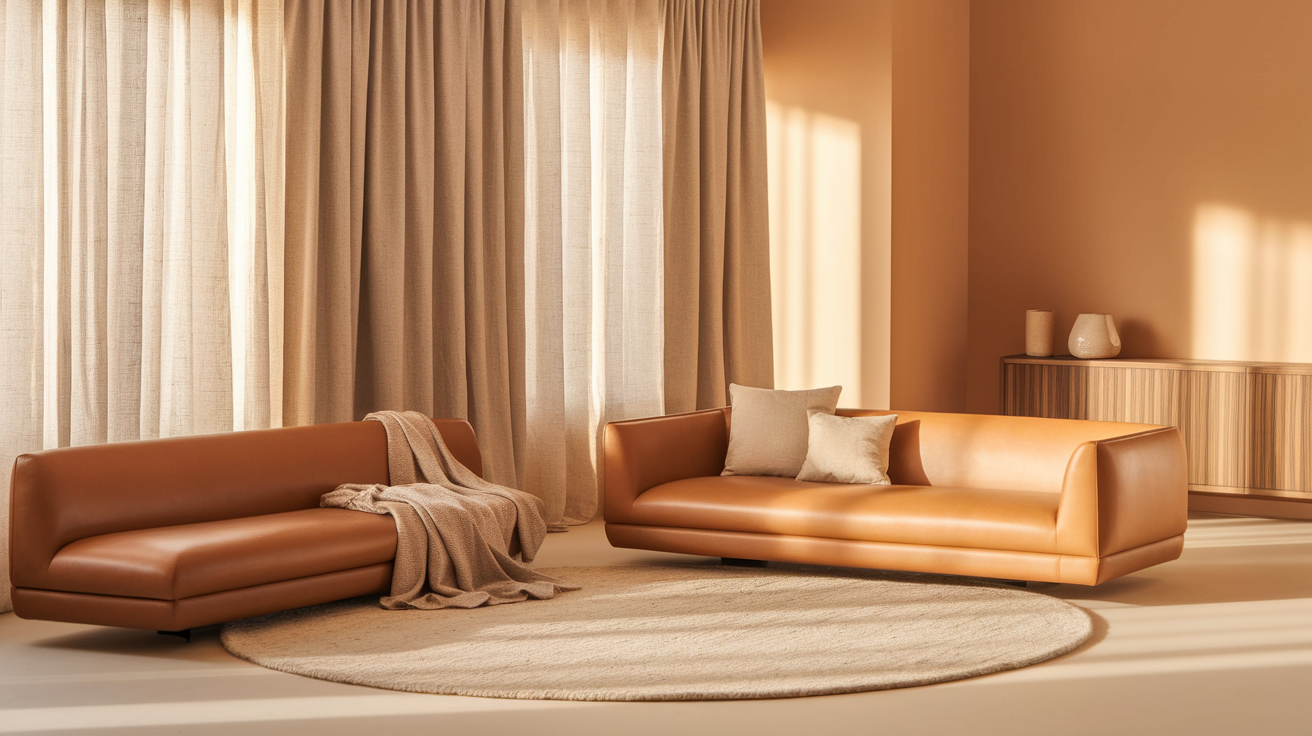
Various forms of one natural color create a refined, united space that seems both current and organic. Different textures stop the room from looking flat.
Smooth leather, rough cloth, and soft wool in similar shades create a peaceful setting that makes natural shapes and materials central.
| Main Idea | Pick one shade for the whole room |
| Best Tip | Include objects with different surfaces, matte, shiny, rough, smooth, all in your chosen color |
10. Morning Light Color Selection
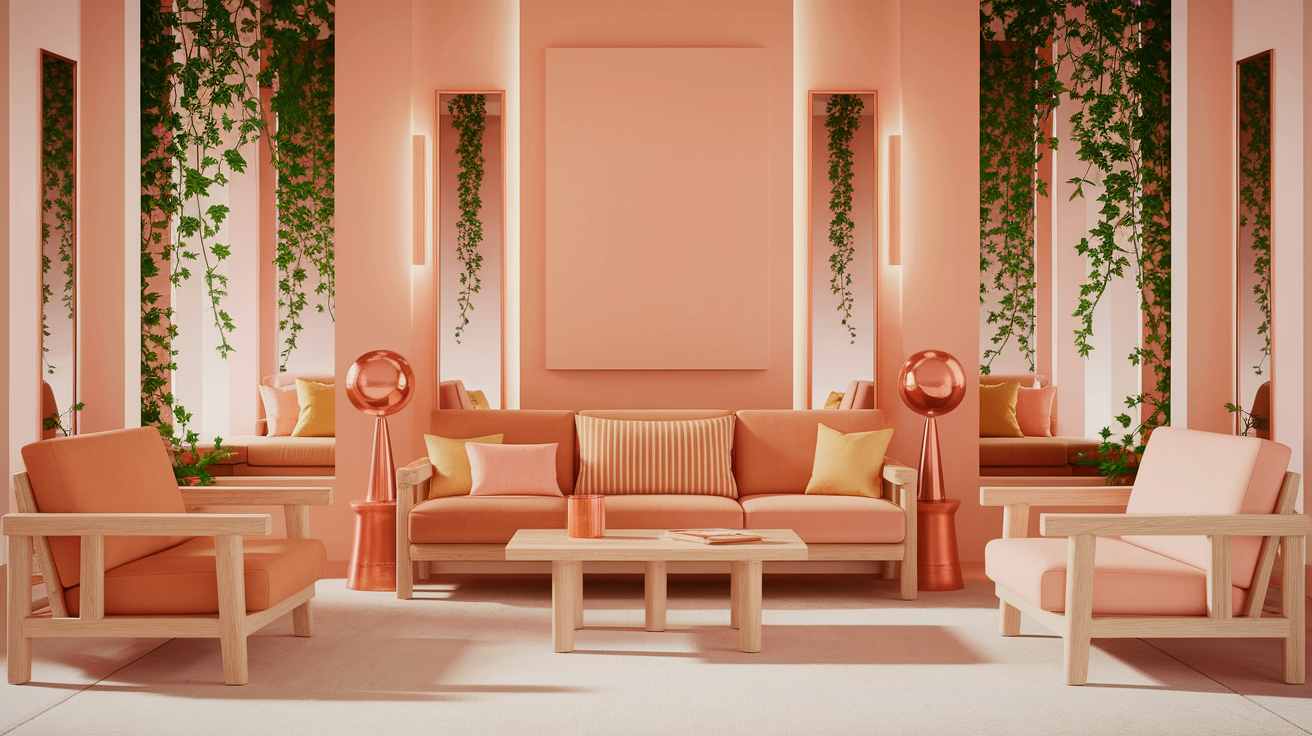
Soft dawn tones make a space that feels naturally bright at all times. Gentle pinks, warm golden browns, and soft yellows copy first daylight.
This method uses color to create an ongoing sense of new starts and fresh natural brightness throughout the entire day.
| Main Idea | Plan for how early the sun fills the room |
| Best Tip | Add small mirrors in key spots to bounce the soft morning light throughout the room |
11. Sunlight Increase Plan
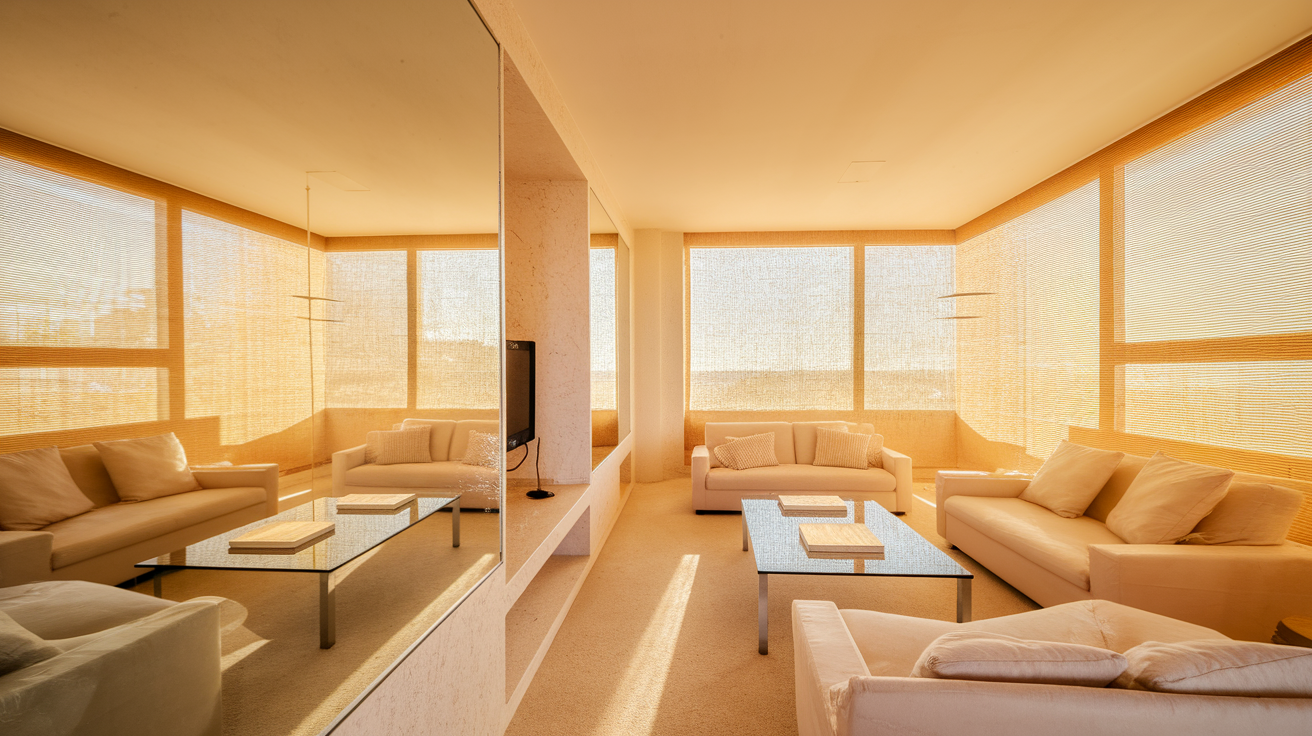
Window placement and light-bouncing surfaces increase available sunlight, cutting down on lamp use. Glass and polished stone move light throughout rooms.
Small window covers made from natural fibers soften rather than stop sunshine from coming into the room.
| Main Idea | Ways to make a room seem sunny |
| Best Tip | Use glass-topped tables that allow light to pass through instead of being blocked |
12. Natural Sound Quality
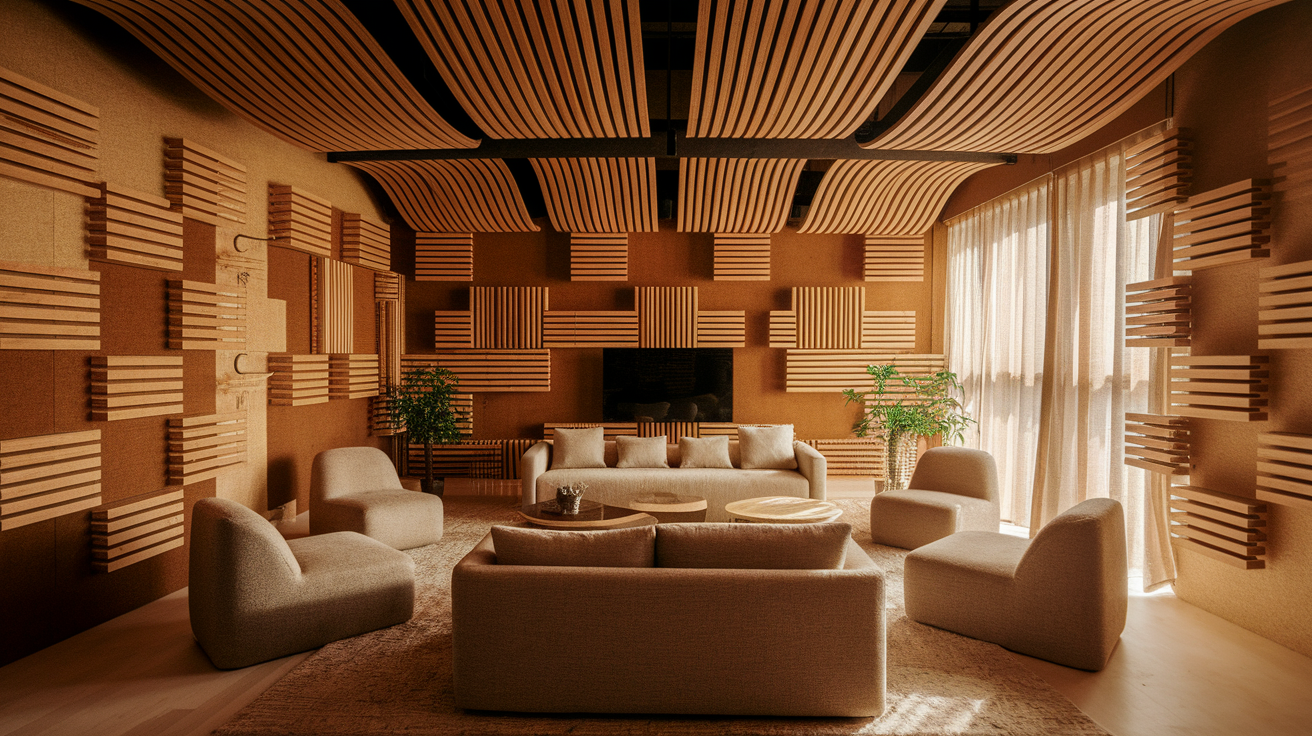
Wood panels and material layouts that better sound quality for music and talking. This method uses the natural sound traits of wood and wool.
Like concert rooms built with sound features in mind, this creates ideal listening conditions in your living area.
| Main Idea | Create a space with good sound |
| Best Tip | Place furniture to create talking areas with good sound flow |
13. Handmade Pottery Focus
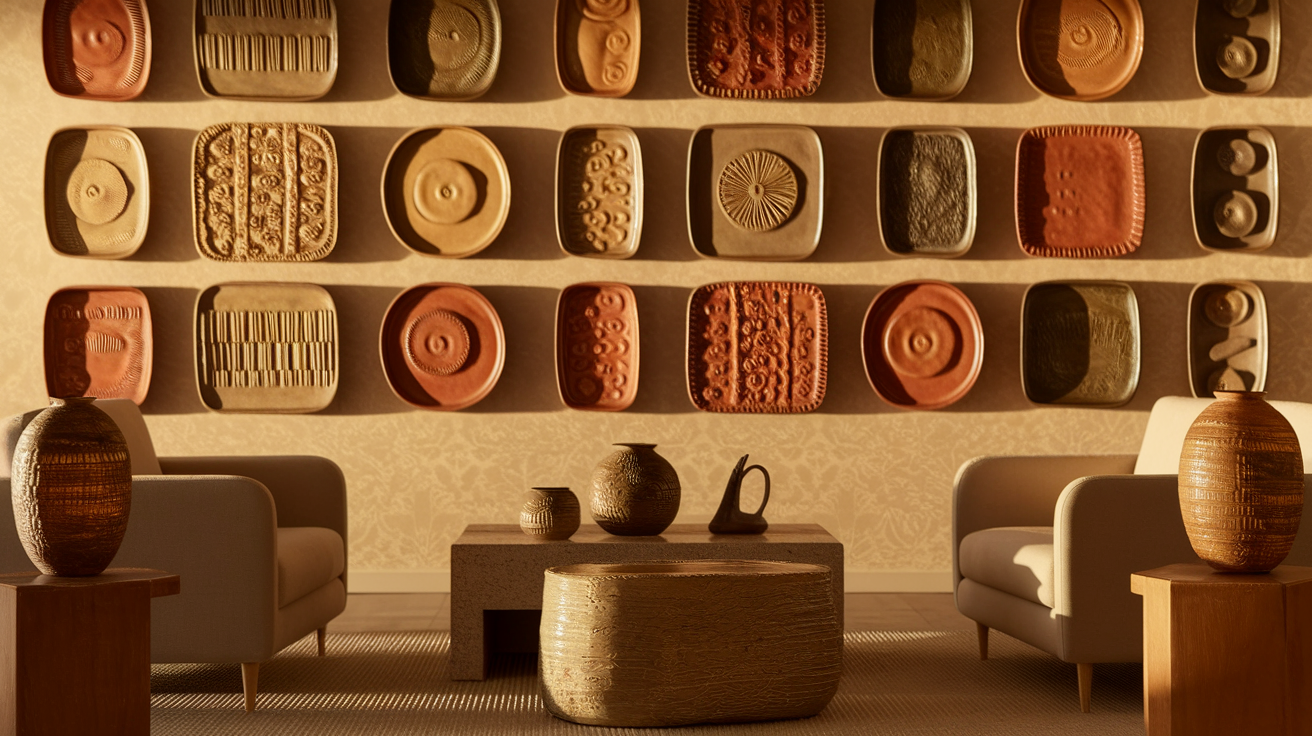
Handmade clay works add an earthly vibe throughout the space. Wall-mounted ceramic art creates texture interest with natural forms and finishes.
Lamps with handcrafted bases show subtle color changes through mineral glazes, linking to the earth’s natural makeup.
| Main Idea | Show off clay items you love |
| Best Tip | Group pottery by color, use, or maker to tell visual stories |
14. Rock and Water Features
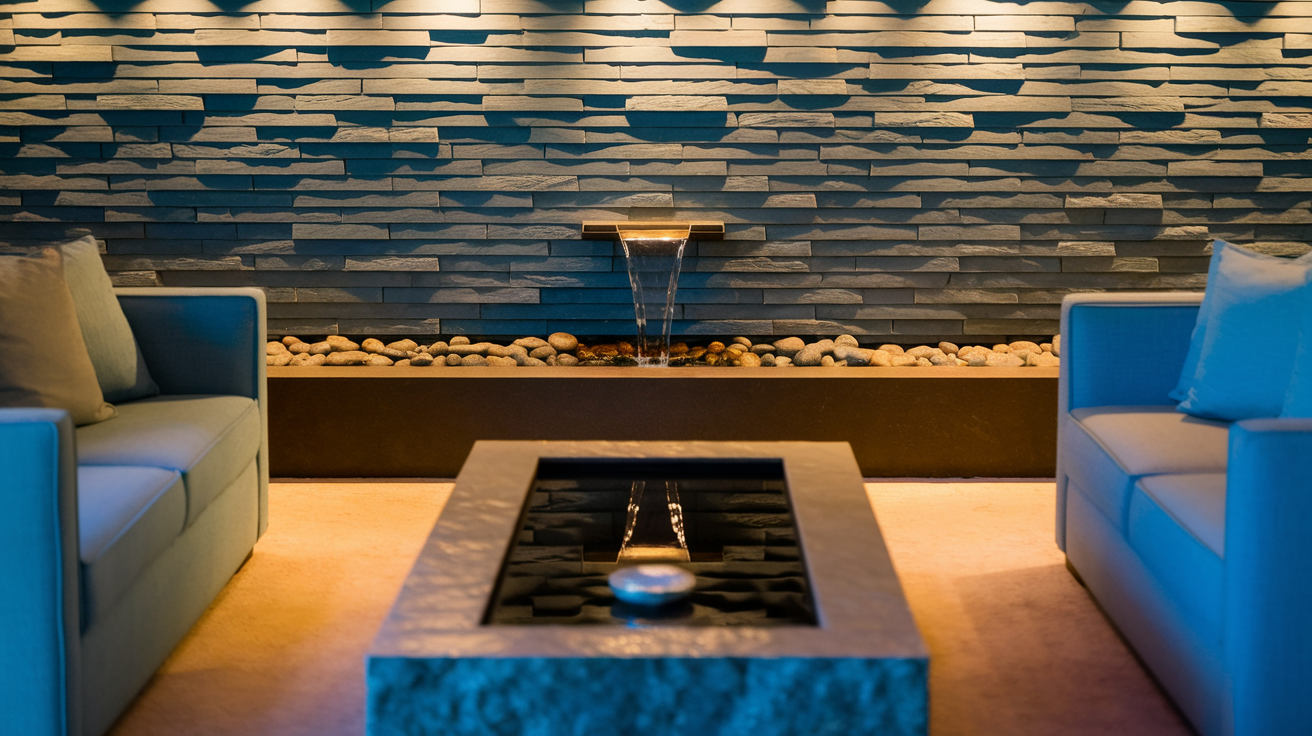
Natural stone items, with textures from rough to smooth, connect to mountain views. A small water feature adds gentle flowing sounds.
Cool-looking stones like slate set a calm, reflective mood while adding visual interest to the space.
| Main Idea | Bring nature inside with stones and water |
| Best Tip | Use different stone types together, smooth river stones next to rough granite, for visual contrast |
15. Natural String Material Blending
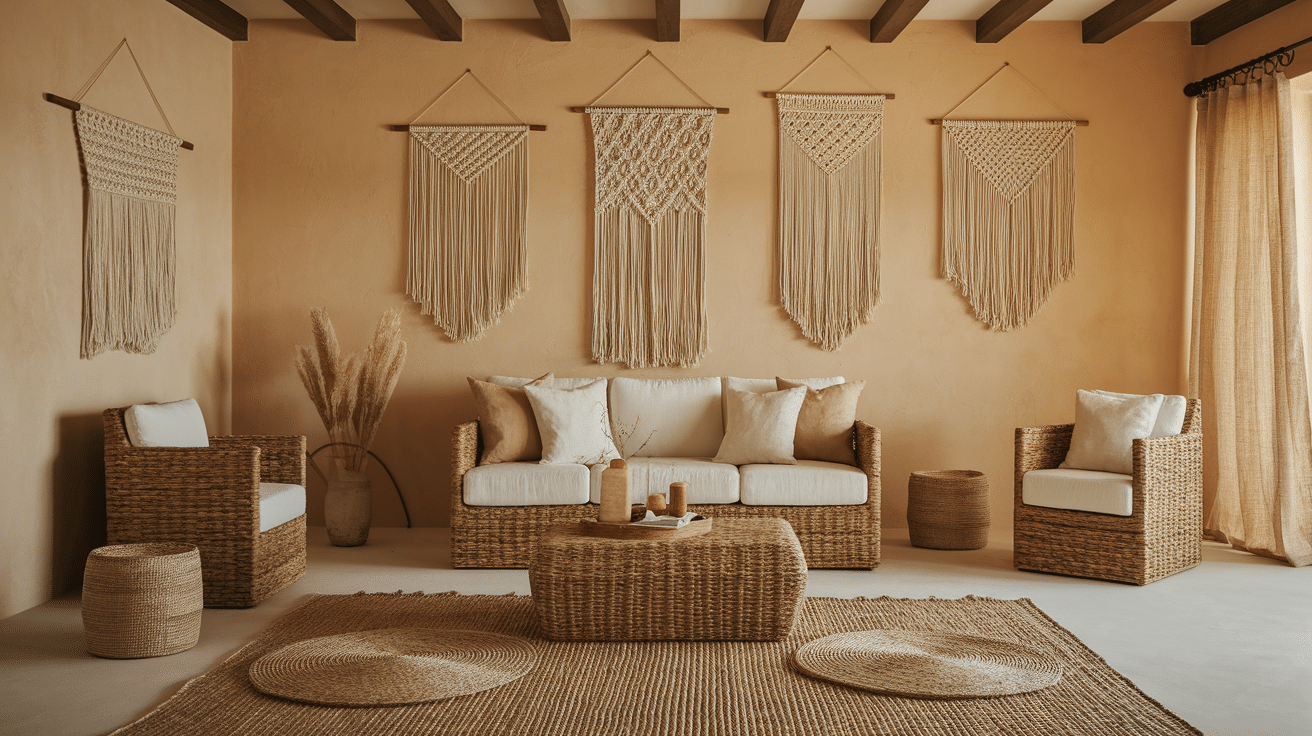
Through careful placement, plant and animal fibers create a rich textured base. Multiple floor covers with varied natural materials mark different functional zones.
Wall art made from organic strings adds depth without man-made materials, creating a touch-friendly experience throughout the room.
| Main Idea | Use items made from natural string |
| Best Tip | Include baskets woven from natural fibers for useful storage that adds texture |
16. Smooth Modern Shapes
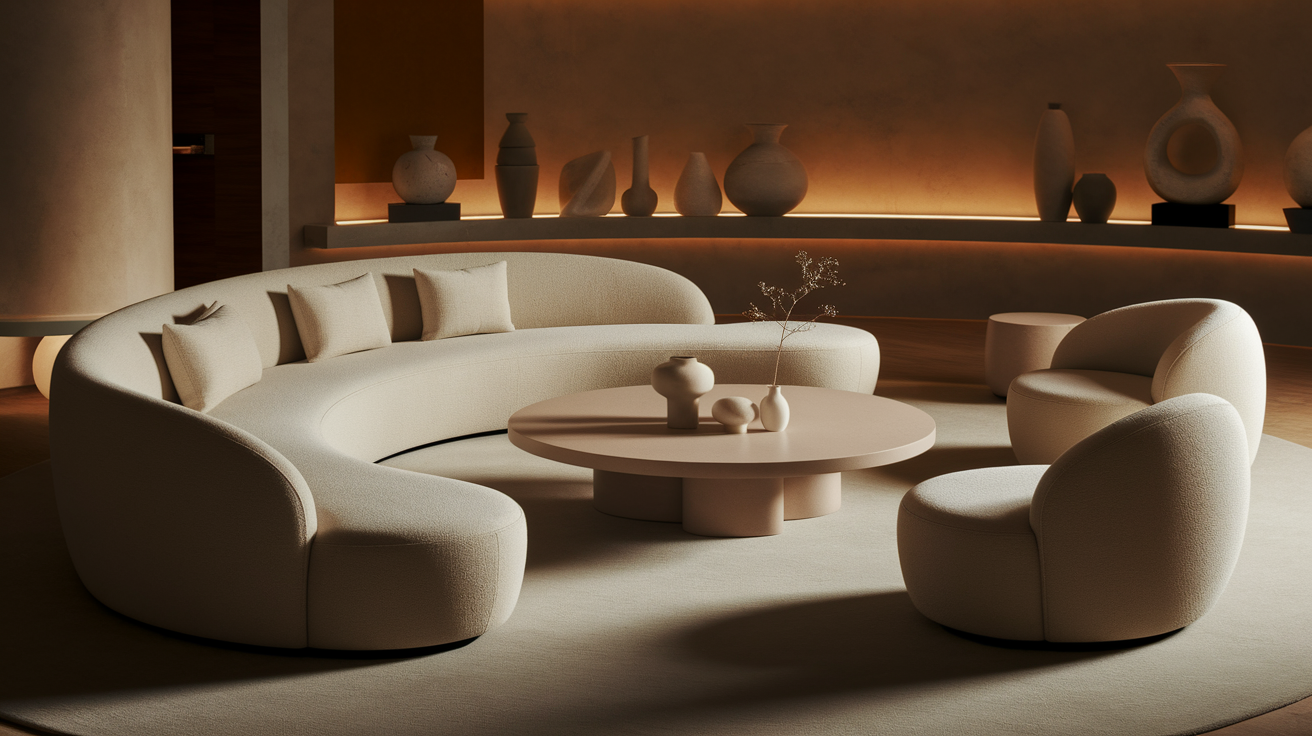
Furniture with rounded forms replaces sharp corners. These shapes mirror those in nature, making a subtle link to living forms.
The rounded parts soften the room and create a more friendly flow while maintaining a clean, modern look.
| Main Idea | Focus on smooth, round forms |
| Best Tip | Balance curved furniture with straight-lined extras to create visual interest |
17. Night Light Planning
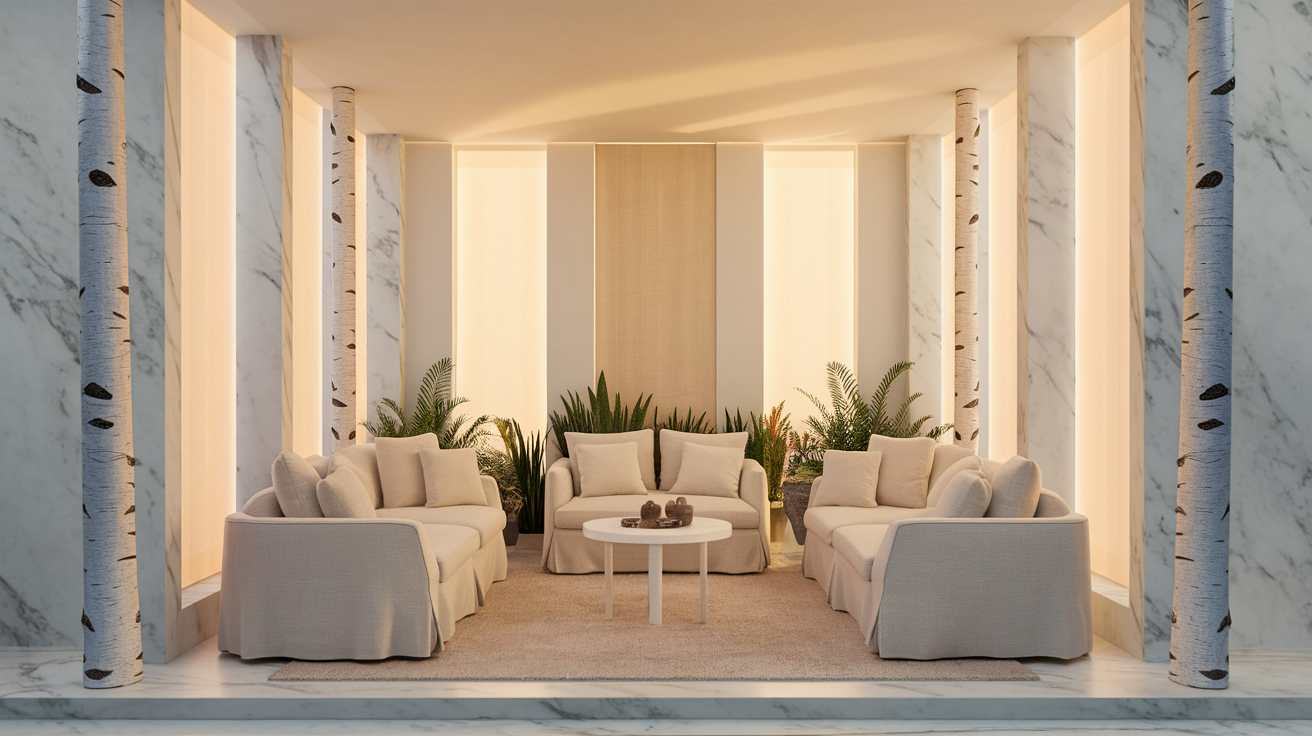
A room made to look its best during evening uses pale, light-reflecting surfaces that shine in low light. Cool-toned natural materials maximize moonlight.
White stone, silver-colored wood, and light fabrics catch and spread the night sky. This connects to natural night lighting cycles.
| Main Idea | Create a room that looks good at night |
| Best Tip | Use salt lamps or light fixtures made from stone that glow with a soft, natural light |
18. Natural Color Areas
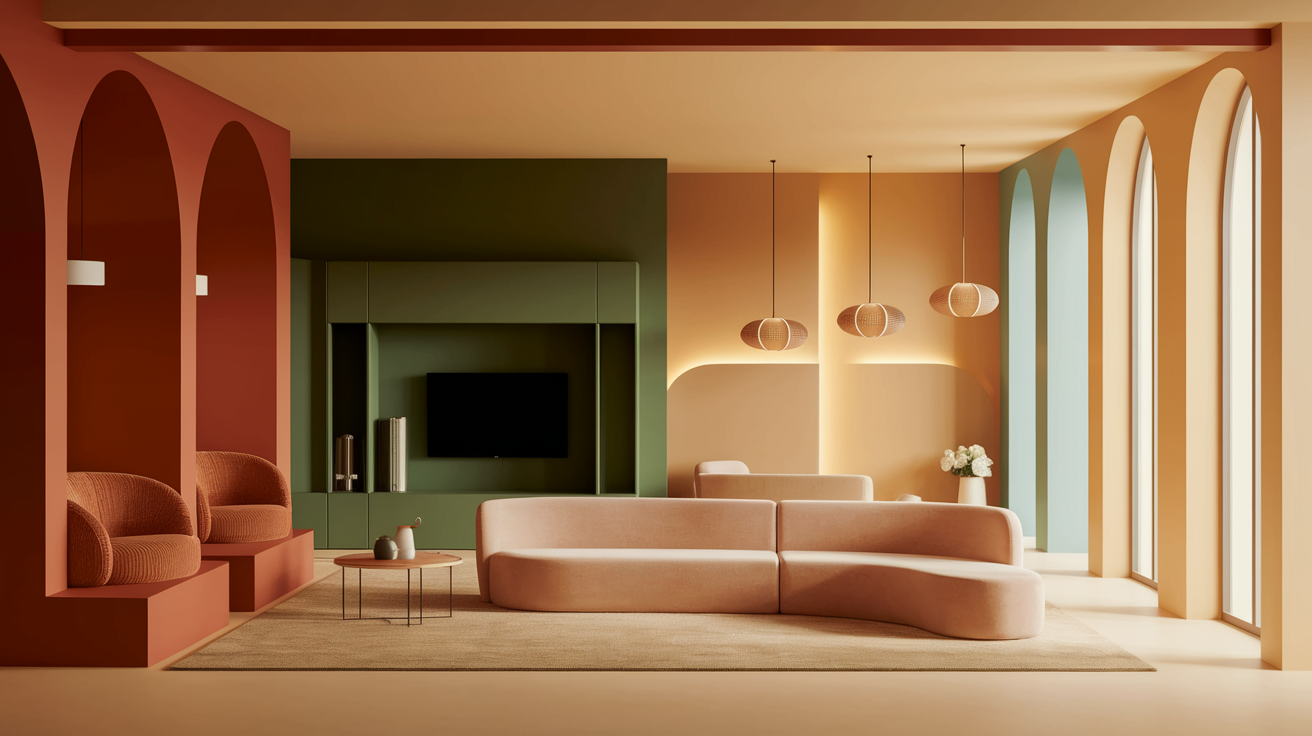
Clear areas of natural colors create visual order without artificial shades. Red-brown, forest green, sand, and sky blue zones mark different spaces.
This current take on color sections uses only pigments found in wild settings while keeping the room organized.
| Main Idea | Split the room into areas by color |
| Best Tip | Use natural room dividers like wooden screens or plant groups to mark zone changes |
19. Used Wood Main Wall
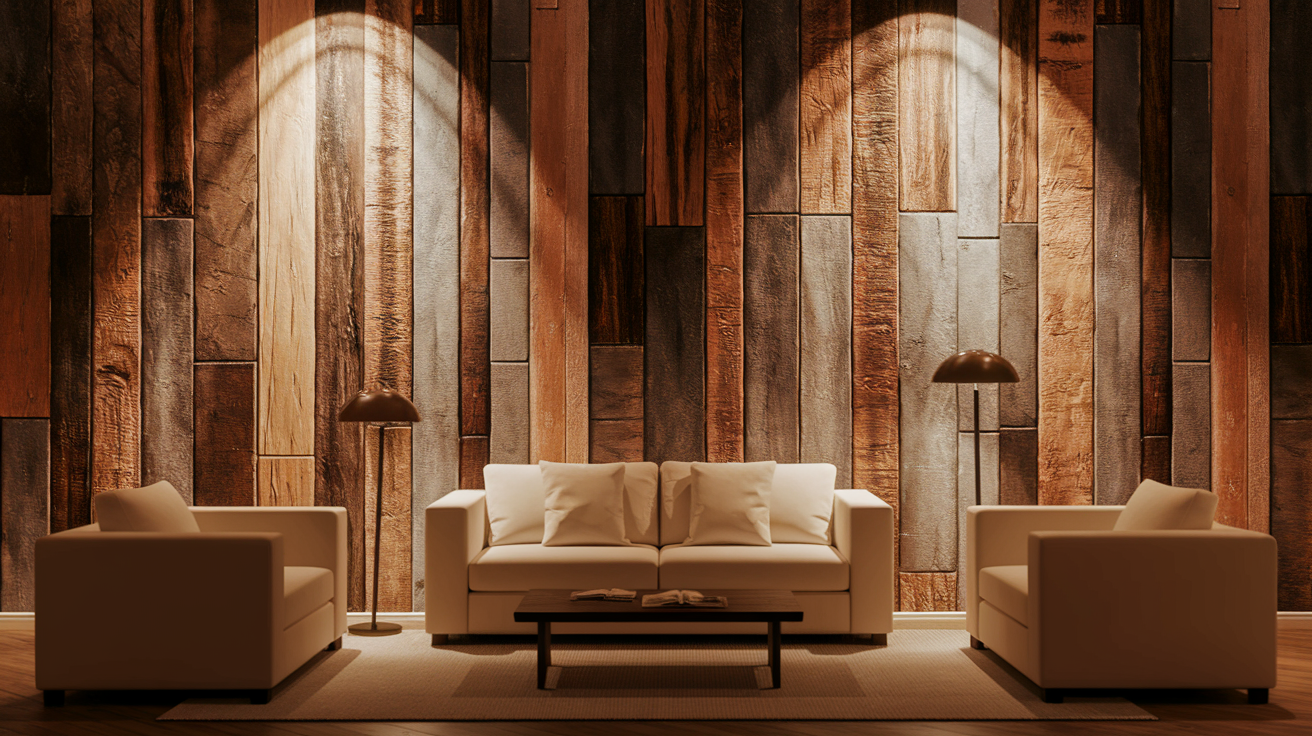
Worn wood from old buildings makes a textured wall with time depth. Each plank tells a story through tool marks, holes, and age.
This wall becomes the room’s main focus, letting other items stay simple and basic in comparison.
| Main Idea | Make one wall from old wood |
| Best Tip | Add metal items with a natural aged look to match the feel of the old wood |
20. Natural Silk Fabrics
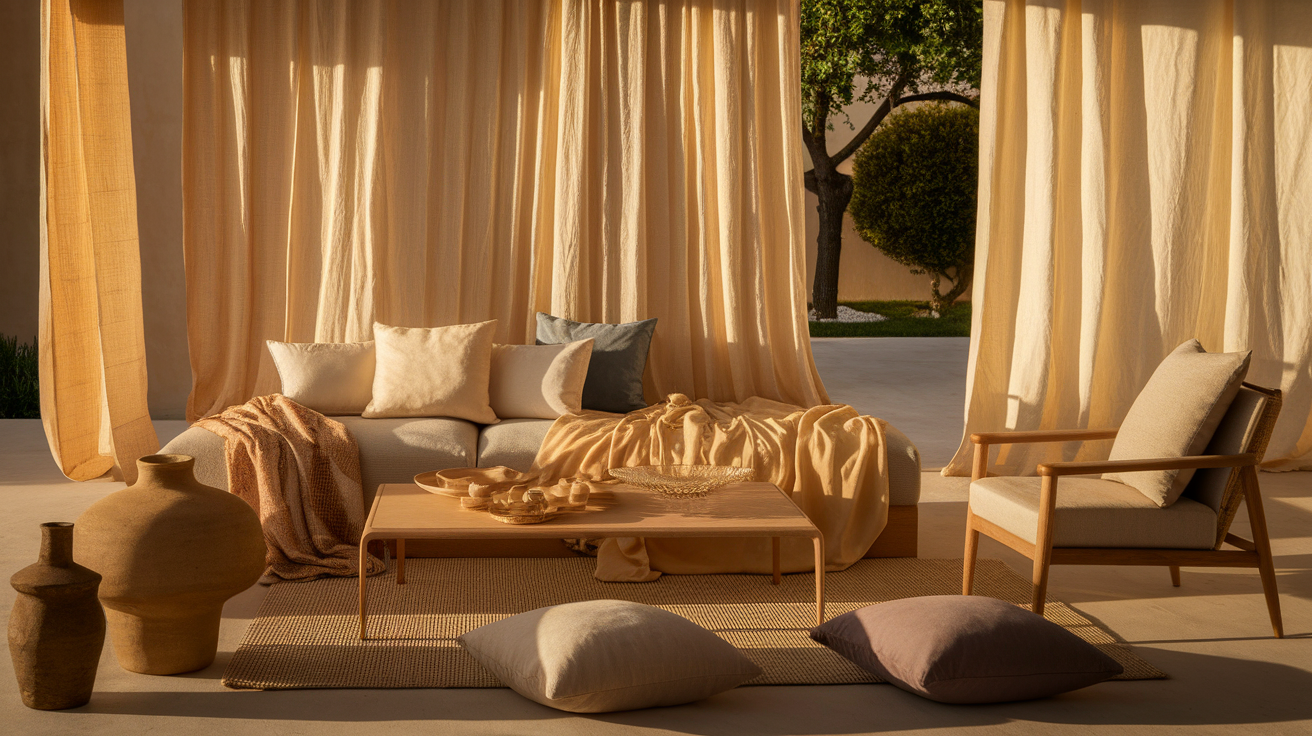
Silk cloths, with their typical bumps and changes, create luxury through texture rather than shine. The natural flaws in raw silk connect to nature.
This approach values the small variations over machine-perfect production in all fabric choices.
| Main Idea | Use real silk for a rich feel |
| Best Tip | Layer different weights of silk together, heavy raw silk pillows against lighter silk throws |
21. Quiet Room Creation
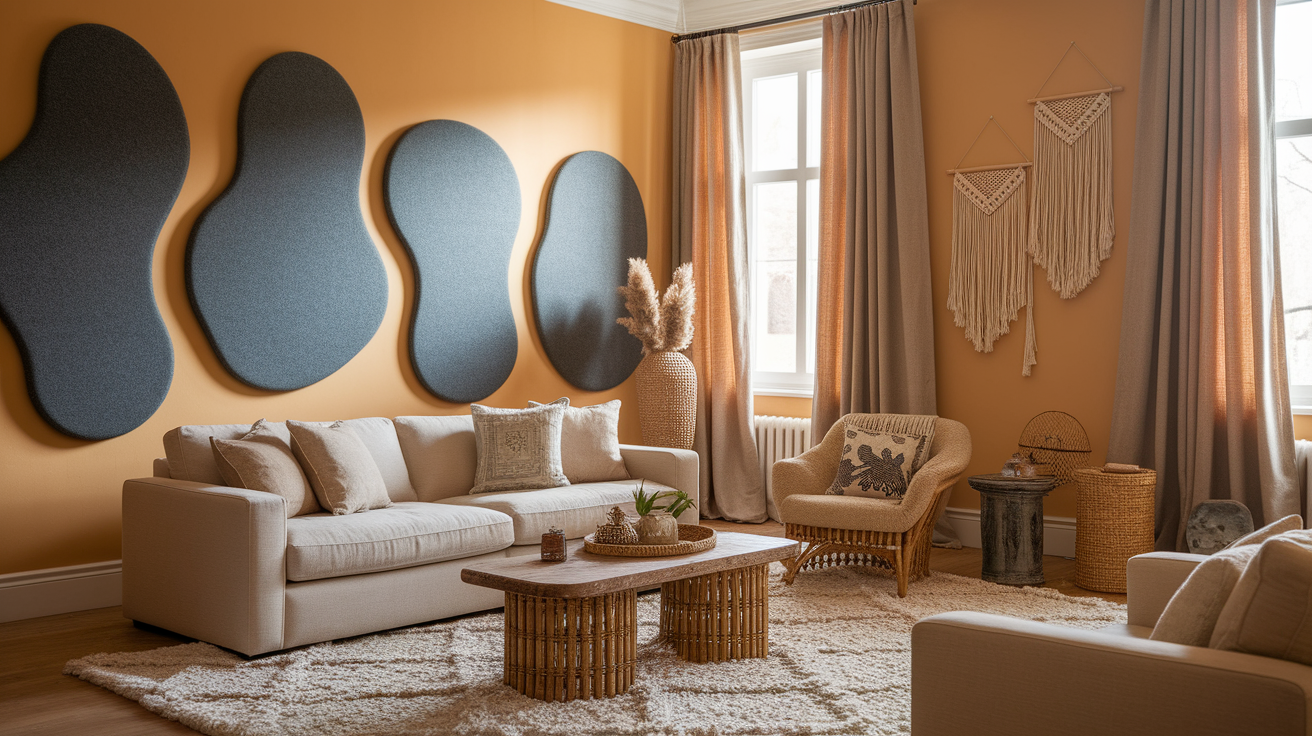
Wool panels, woven wall art, and natural string curtains create sound comfort. These parts absorb noise that would bounce off hard surfaces.
The outcome is a quiet, calm setting that helps conversation and rest without using foam or plastic materials.
| Main Idea | Make a space that blocks noise |
| Best Tip | Put bookcases against walls shared with louder areas of the home |
22. Local Material Display
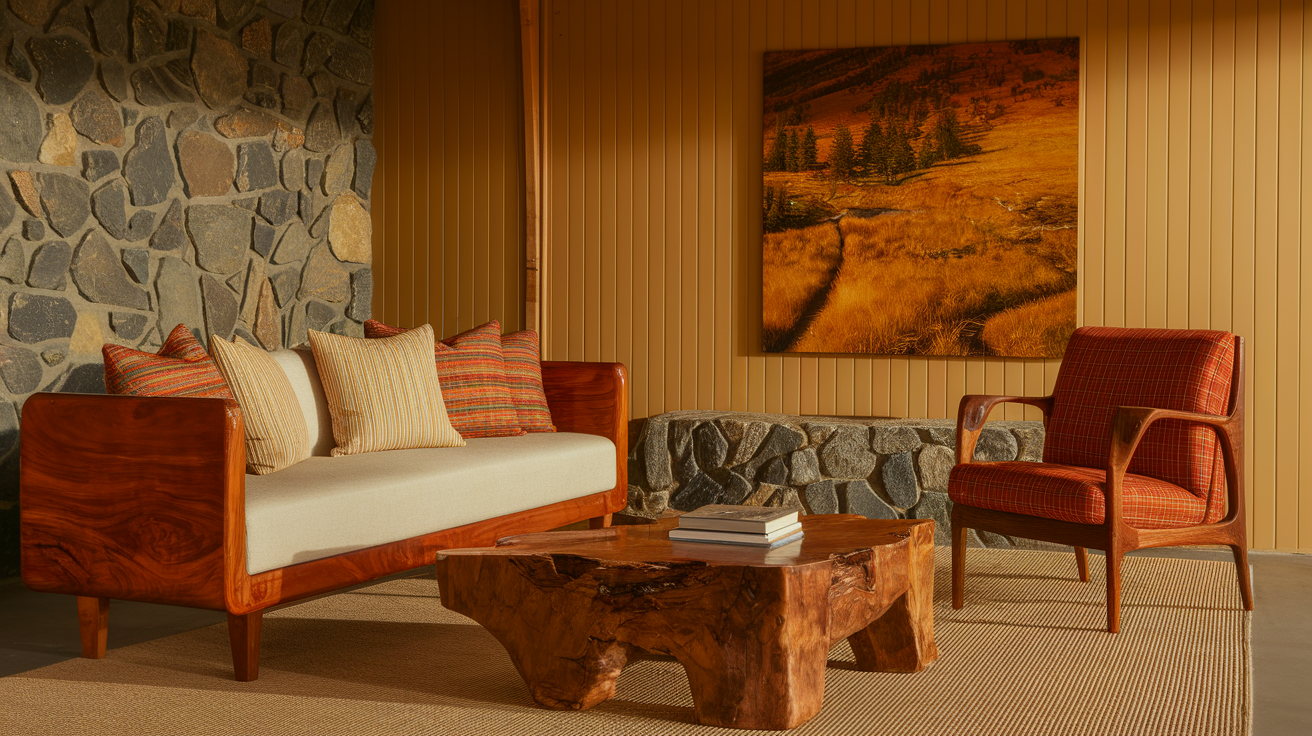
Rooms built around materials found within 100 miles create spaces tied to their location. Local woods and stones vary by area, making a unique style.
This method supports nearby crafters while cutting down on shipping impact and costs.
| Main Idea | Show off items made near your home |
| Best Tip | Ask area craftspeople to make custom pieces that show off local materials |
23. Natural Cowhide Changes
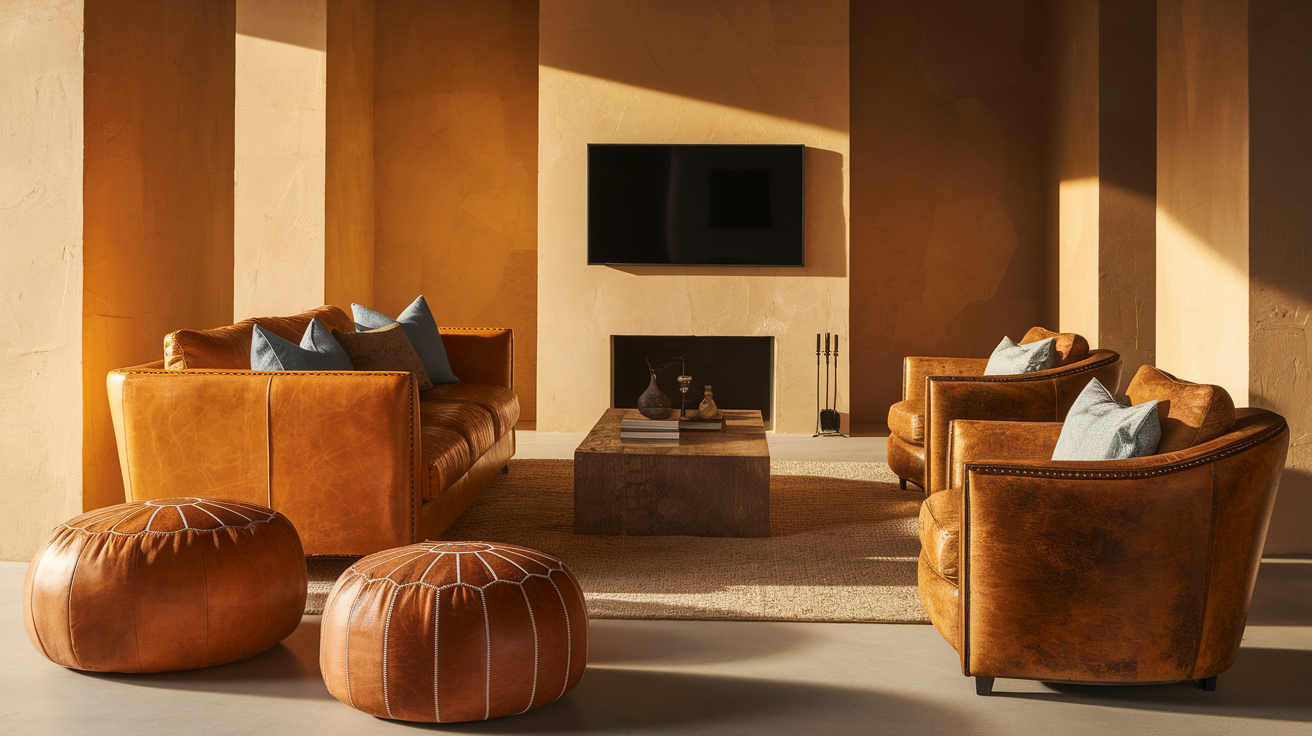
Full-grain animal skin items are picked to grow richer with time. Unlike treated hides, these natural ones change with use and get better with age.
The skin’s natural marks are shown rather than hidden, highlighting the organic roots of the material.
| Main Idea | How to use and keep cow skin items |
| Best Tip | Create a care plan that builds a natural look, light oiling or dusting as needed |
24. Outside-Inside Flow
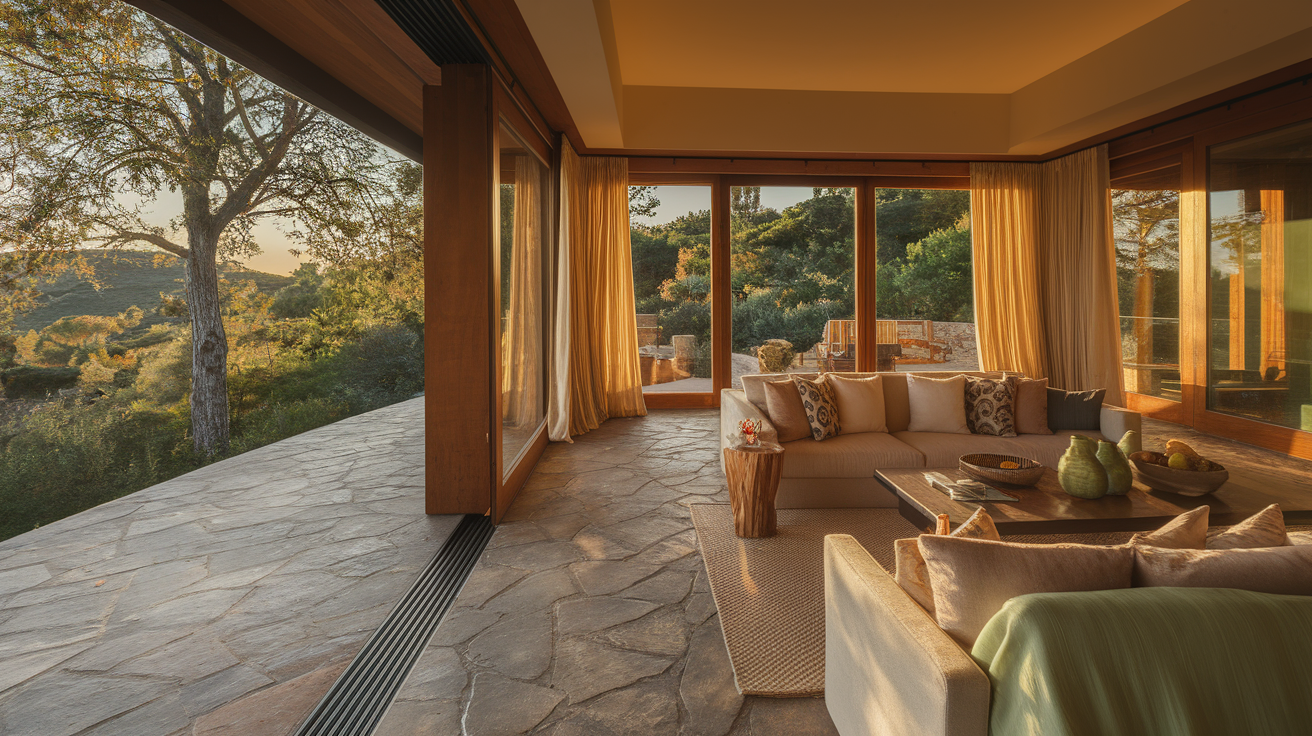
The inside finishes match the nearby outdoor spaces, making the transition between settings smooth. Stone floors that continue to an outside patio connect the areas.
Wood colors that match nearby trees and cloths in colors found in local views join the indoor and outdoor worlds.
| Main Idea | Make the inside feel like the outside |
| Best Tip | Use the same types of plants both inside and outside for a smooth look |
25. Wood Pattern Direction
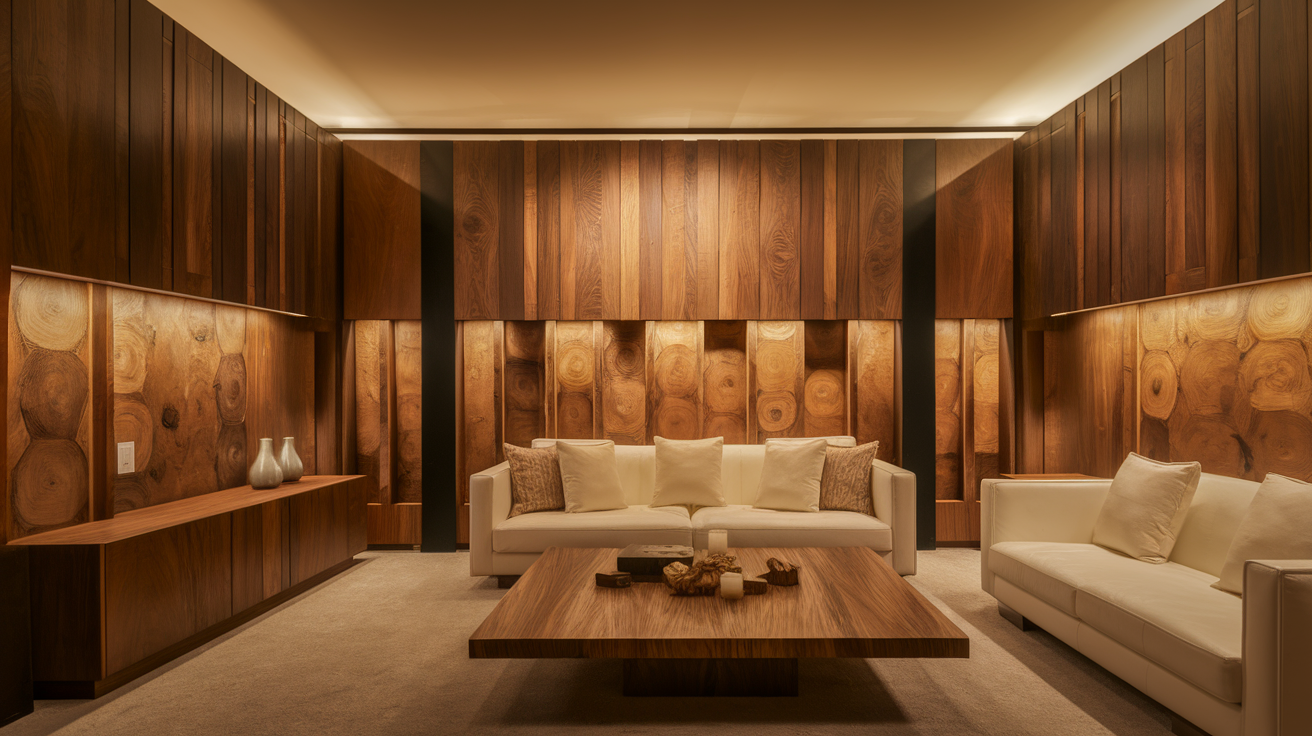
Wood parts are placed to show natural grain patterns, creating a fine visual rhythm. Up-and-down patterns draw the eye upward, while side-to-side patterns suggest stability.
This careful placement of natural patterns makes mild order without fake or added parts.
| Main Idea | Show off the lines in wood |
| Best Tip | Use lighting that makes shadows that stress the grain direction |
26. Basic Purpose Design
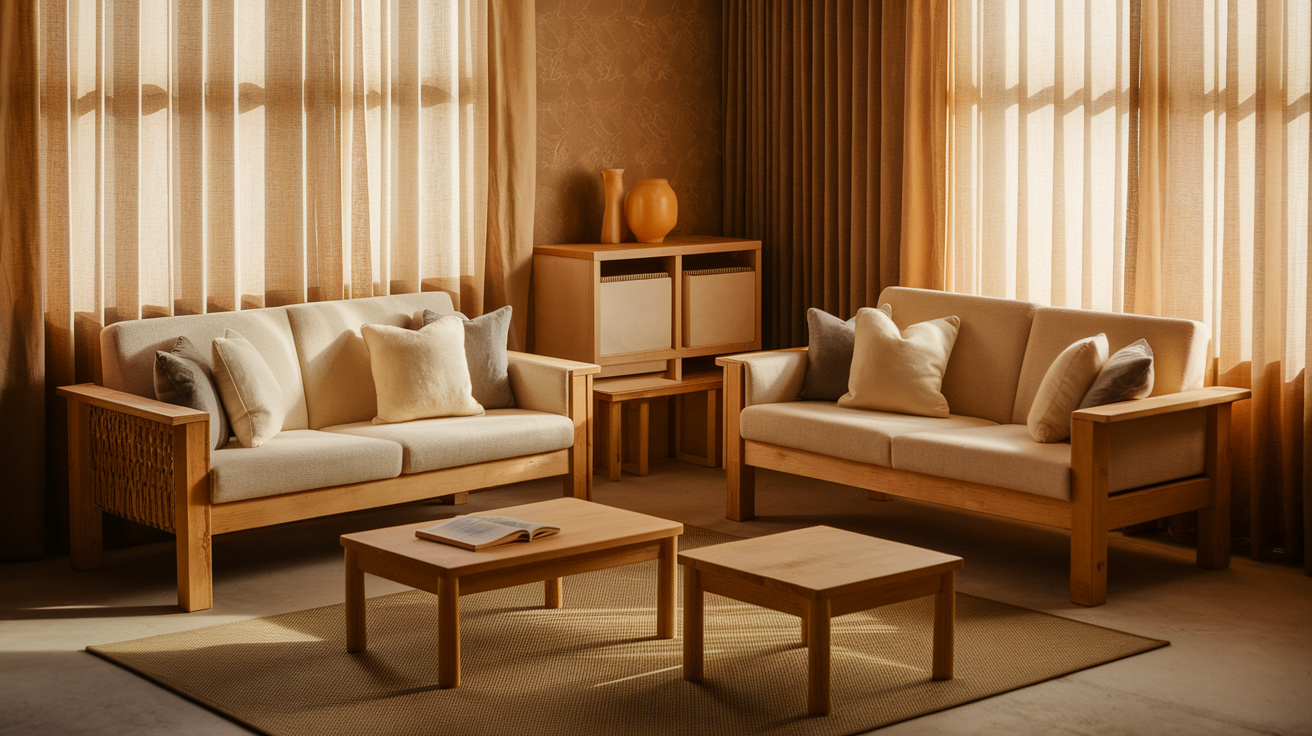
Every item serves a clear purpose without needing additional items or having too many features. This mirrors nature’s output, where shape follows need.
Materials are chosen for lasting qualities and good aging, making a space that gets better rather than worse with time and use.
| Main Idea | Focus on how things work, not just look |
| Best Tip | Create a set place for each item to rest when not being used |
27. Sky View Connection
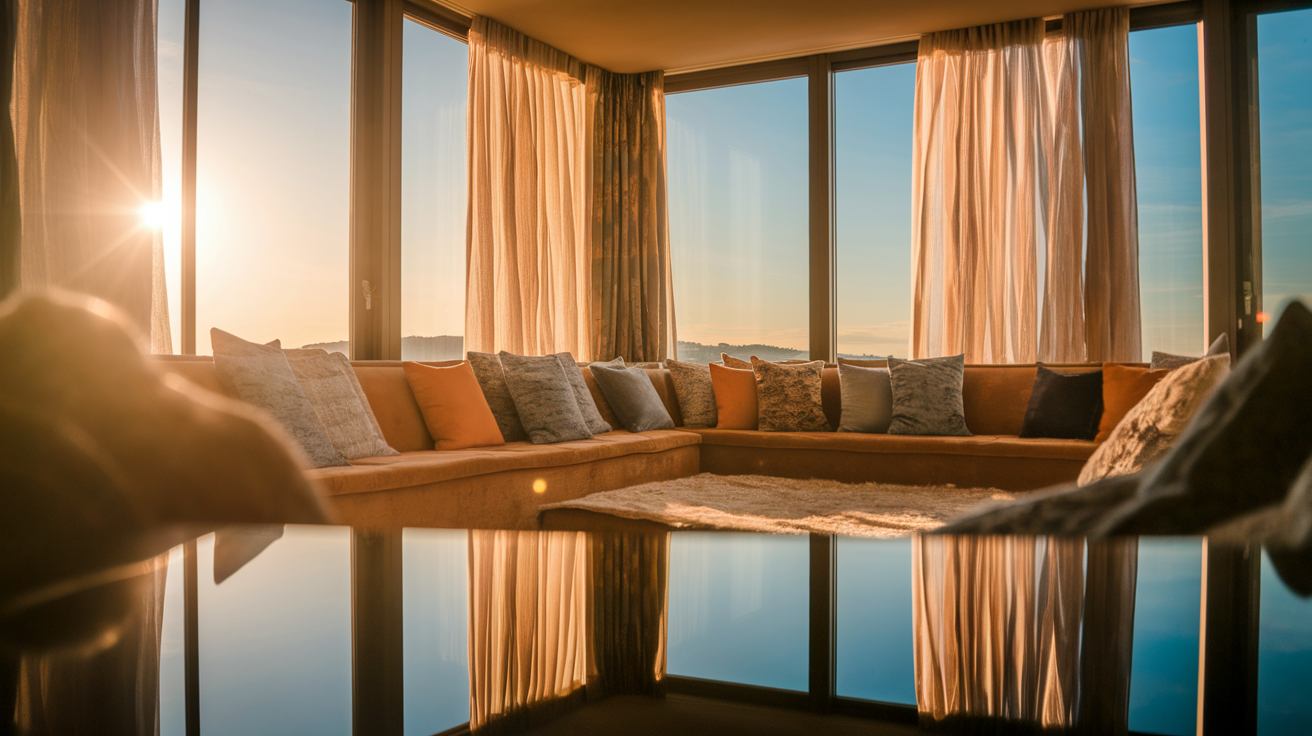
Furniture placed toward windows creates a continuous link to the changing sky. Cloud shapes, star patterns, and weather shifts become part of life.
This focus makes natural light cycles and air conditions central to the room’s overall feel and function.
| Main Idea | Plan around windows that show the sky |
| Best Tip | Create comfy viewing spots for different times of day, morning coffee or evening stargazing |
28. Plant Color Fabrics
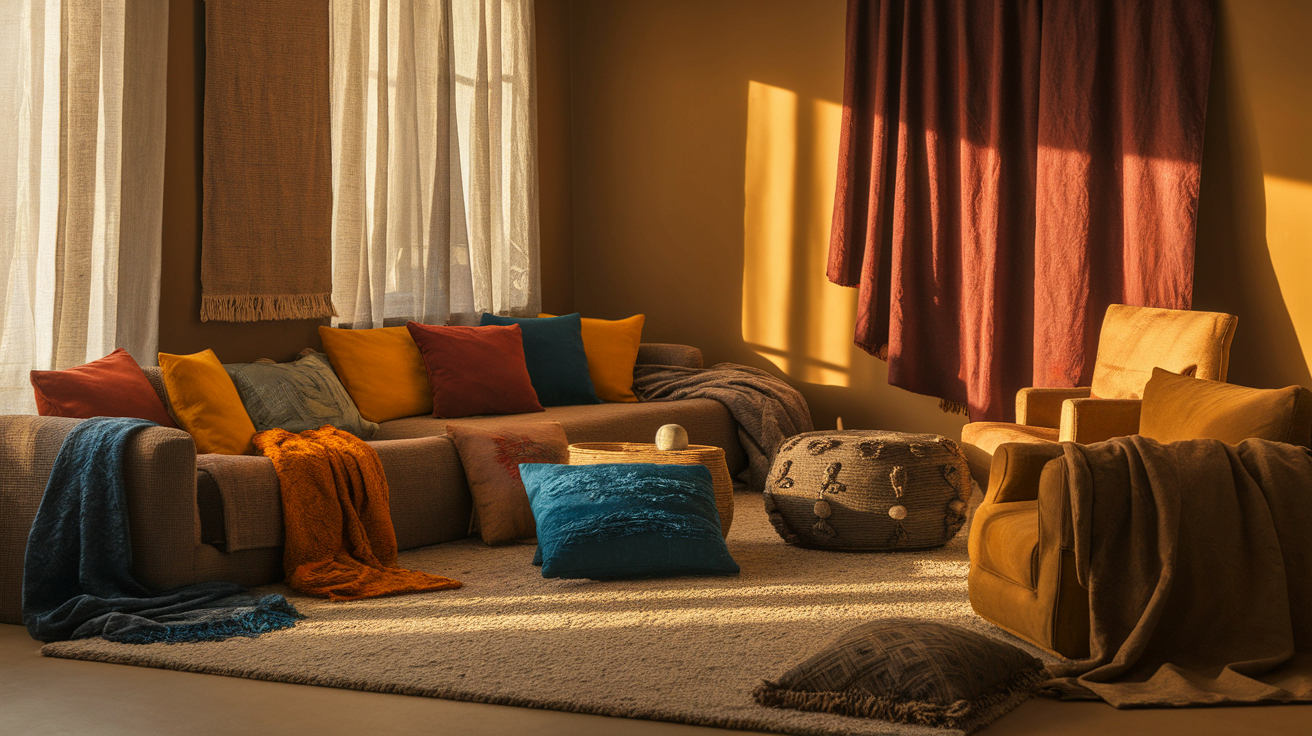
Cloths colored using plant-based materials create mild, matching color sets impossible to achieve with chemical dyes. Blue, red root, and nut shell dyes connect fabrics.
The small color changes from plant-dyeing methods add depth and genuineness to all textile items.
| Main Idea | Use fabrics colored with plants |
| Best Tip | Learn about local plants that can create different natural dyes |
29. Special Wood Pattern Highlight
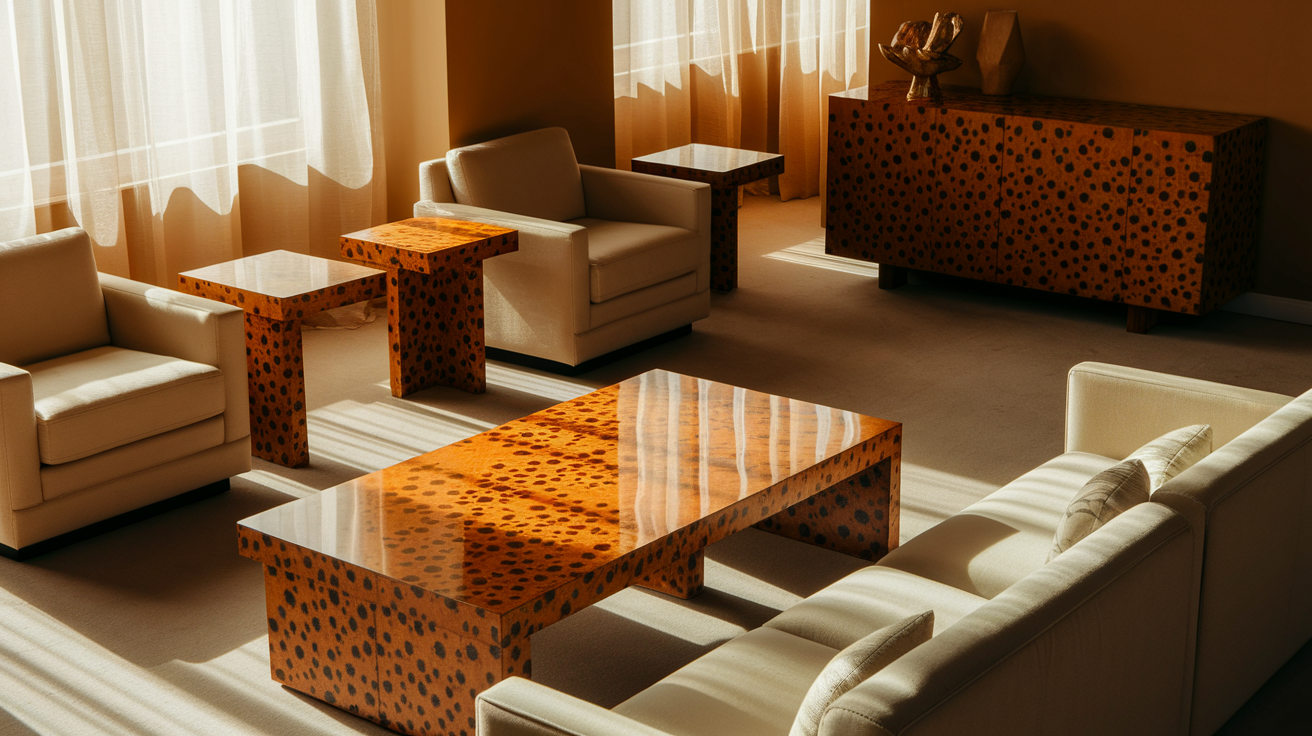
Furniture showing the special spotted pattern found in certain maple trees adds interest. This naturally formed wood figure creates appeal without stains.
The uncommon, valued pattern connects to the special ways trees grow based on their setting and conditions.
| Main Idea | Show off wood with neat patterns |
| Best Tip | Put patterned wood where light will show its unique look best |
30. Woods Ground Concept
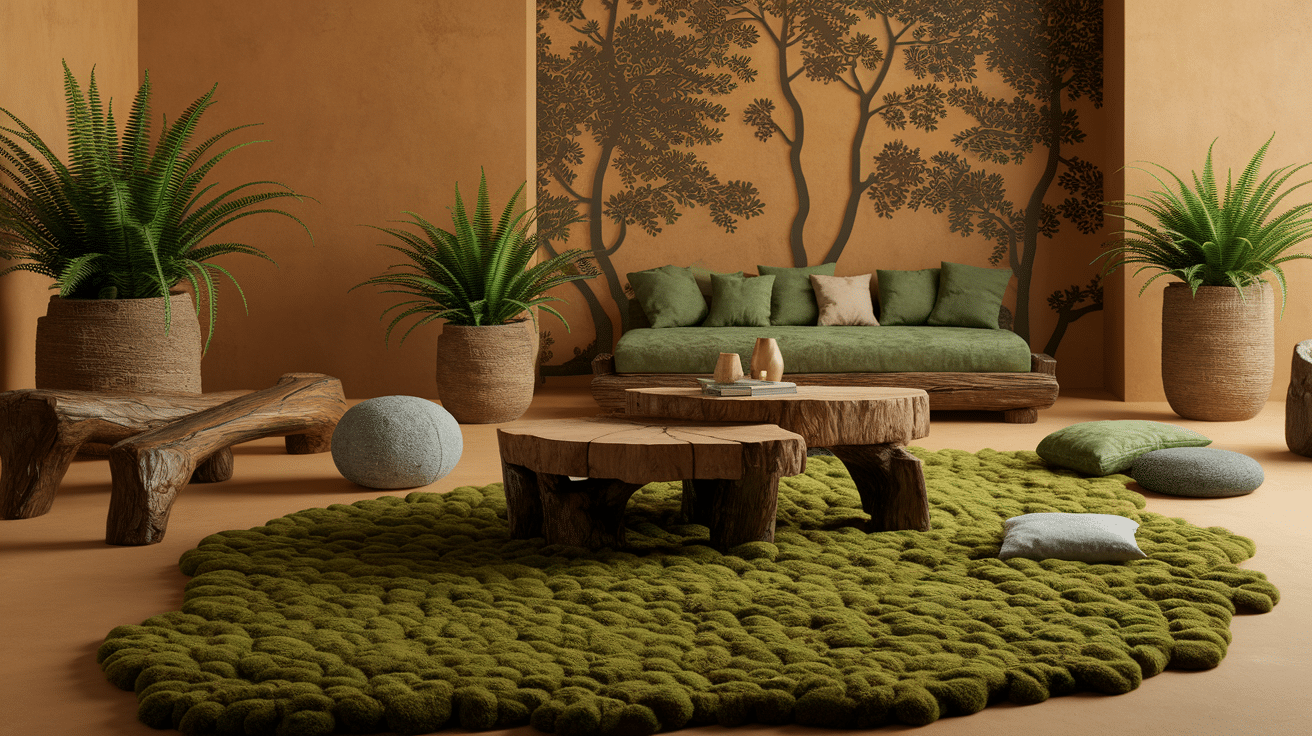
Natural items that copy the layers of forests create a connected system of design. Moss-like wool rugs, varied woods, and plant parts copy forest structure.
This method builds a complete nature-based arrangement within a home setting for a coordinated look.
| Main Idea | Make your space feel like a wood |
| Best Tip | Create small glass gardens that bring tiny forest floors inside |
31. Open Display with Natural Items
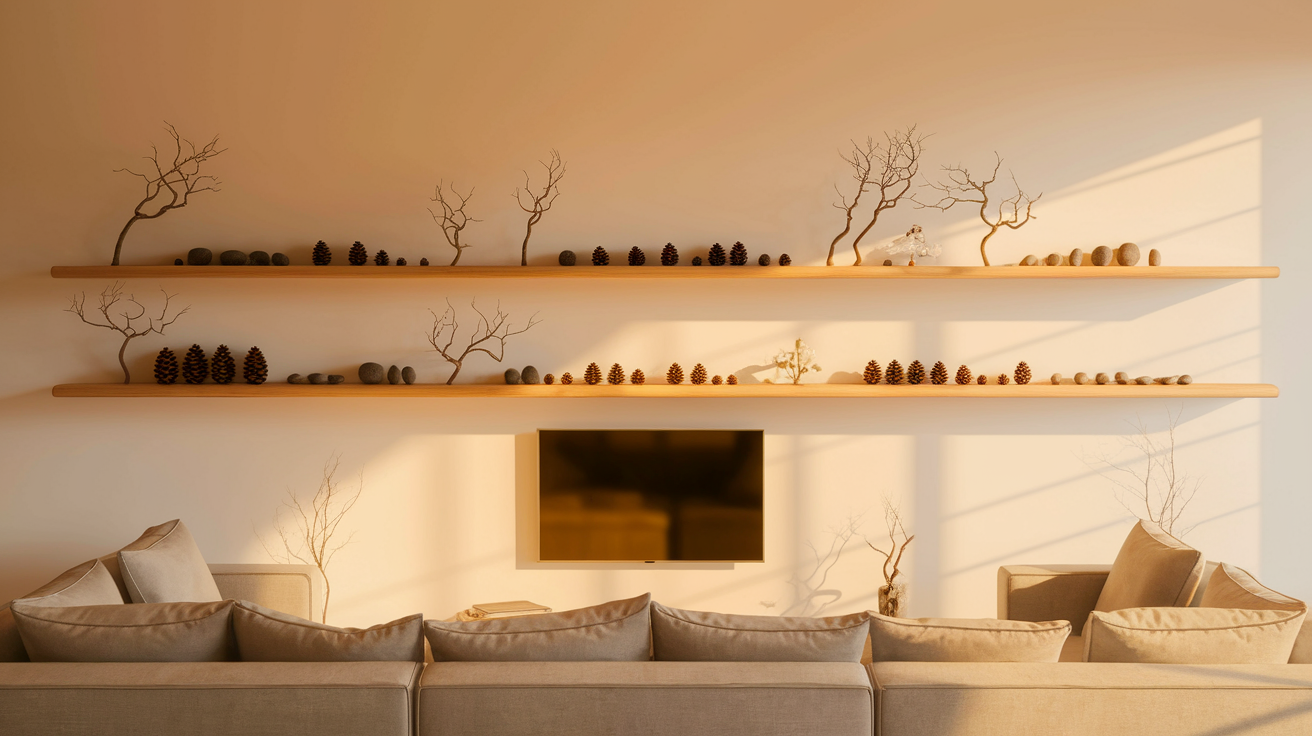
Switch to closed storage for simple open wood shelves that show a careful selection of natural objects. Seed pods, rocks, and branches become visual interest points.
This method costs almost nothing while creating strong bonds to nearby nature through personal collecting.
| Main Idea | Show off things found in nature |
| Best Tip | Change your displays with the seasons to match what’s happening outside |
32. One Material Emphasis
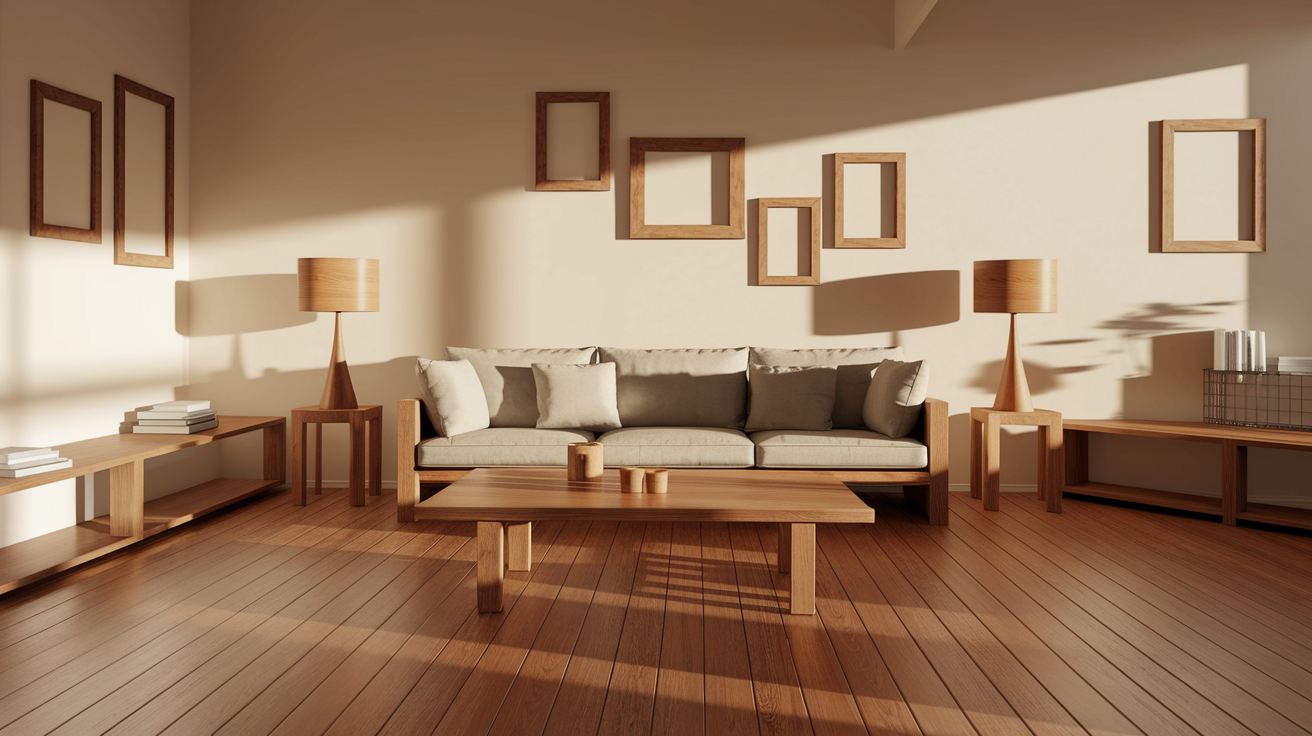
Pick one natural item as the main feature and use it throughout the space. This might be oak, wool, stone, or different forms of one material.
This practical method creates unity while staying cost-effective, as you can focus your money on quality pieces in just one material group.
| Main Idea | Focus on a single natural material |
| Best Tip | Learn the old ways of working with your chosen material to show its best qualities better |
Conclusion
Organic rooms remain current because they work with human instincts rather than passing trends. Wood, cotton, wool, and stone carry timeless beauty that fits many styles.
These ideas show that organic spaces need not be costly or complex. Simple changes with natural items create rooms that feel original, calm, and deeply comfortable.
Making homes that echo nature helps create needed balance against our technology-filled days. Natural rooms feel like breaks from screens, artificial lights, and constant noise.
To start, try adding just one natural concept from this list. Watch how it changes your room’s look and how you feel when you spend time there.

